

Space Flight Tourism IELTS Reading Passage
Space flight tourism ielts reading passage with answers.
Reading Passage 2
You should spend about 20 minutes on Questions 14-26 which are based on Reading Passage 2 below.
Space Flight Tourism
Falcon 1’s successful launch on 28th of September was an outstanding achievement for the fledgeling space tourism industry. When a rocket made by Space X in Hawthorne, California, reached an orbit of 500 kilometres from the Earth, it became possible for privately developed rocket too.
Two days after the launch, Virgin Galactic started a business with the US National Oceanic and Atmospheric Administration which will be accepted by US scientists as a way of researching climate change using a spacecraft.
No doubt the civilian space flight industry is an exciting area and this was apparent at the International Aeronautical Congress in Glasgow last month. It displayed slick promotional videos, and models of the “Nearly Ready” spacecraft in orbit to the people who would be investing money in the project.
However, in spite of increasing confidence, it is also necessary to be cautious: can a civilian spacecraft be safe like holiday airlines? Gerardine Goh, a lawyer at DLR, the German Aerospace Centre in Bonn and a member of Germany’s delegation to the UN’s Office of Outer Space Affairs reported that as it is not global, there need to be enforceable regulations in place to guarantee the safety of a civilian spacecraft. She said, “Ships should be equipped to be seaworthy, aircraft should be equipped to be airworthy but there is no legislation in place to ensure that a spacecraft is spaceworthy.”
At the International Association for the Advancement of Space Safety, Goh is planning to press the UN to force civilian space operators to warrant which spacecraft are designed and built to minimum safety standards. She says, “Mass commercial space flight does not currently have international safety regulations.” and “We deeply need a UN treaty which offers us this.”
One way companies are planning to transport tourists into space is with a “mother ship”, an aircraft which carries a rocket at an altitude of 16 kilometres before launching it, says Goh. “But with launching the aircraft, the ICAO’s air safety standards only apply to the mother ship and the rocket capsule until they are separated. After that, we do not have any safety standards for the capsule itself. It is a critical problem.”
From 16 kilometres to the Karman line, the point of 100 kilometres up where space is considered to start, the rocket will be travelling within a legal vacuum. Here, lawyers cannot agree on whether it is a plane or a rocket. Some insist that if you are in a well-equipped functioning rocket, more strict safety measures should try to be incorporated into the spaceship’s design.
The other aspects of the UN’s 1967 treaty for outer space exploration may be discussed again if civilian space flight turns out to be successful. For example, countries must consider how to rescue and repatriate astronauts crashing or landing in their land. Also, governments have to decide if the money generated by the space flight industry will be enough to cover the cost of rescuing space tourists.
Civilian space flight companies are very aware of the risks in this field as they have already had the experience of dealing with a tragedy. Unfortunately, three engineers were killed and another three were severely injured in 2007, when nitrous oxide rocket fuel suddenly exploded during fuel flow tests at a Scaled Composites facility in Mojave, California. The company is establishing WhiteKnightTwo, a carrier aircraft and SpaceShip Two, a six-seater rocket for Virgin Galactic. The facility was regulated by California’s health and safety regulator, and it has now modified its technology to decrease the risks.
However, space flight’s dangers are far from just fuel issues. According to Laurent Gathier of Dassault Aviation developing the VSH of a rocketpowered sub-orbital tourist space plane, other critical safety factors are with depressurization risks, passengers close to the engine and the activities of flight trajectories including cosmic ray shielding.
Civilian space companies should incorporate the safety features into their designs. For instance, the VSH will equip an ejector seat for all tourists and staff. It is a device for bailing out of the spacecraft with a default of 40,000 feet (12 kilometres).
Goh’s vision is essentially against the Federal Aviation Administration Office of Commercial Space Transportation (AST) and does not have any schemes to regulate civilian space flight safety until 2012. The Commercial Space Launch Amendments Act of 2004 mentions that George Nield as AST chief said, the civilian space flight regulation must not “stifle” the developing technologies with inconvenient rules.
Before launching, a hands-off approach to civilian space flight could be quite risky. Goh said, “A lack of safety standards and a lot of operational burdens will leave a commercial space flight in the dangerous activity categories in terms of the insurance.” It means insurance costs will be very high. Critics who are developing safety standards also insist that the “at-your-own-risk” mentality that is applied to risky sports like scuba-diving should also be applied to civilian space flight.
Questions 14-20 Complete the summary. Choose NO MORE THAN THREE WORDS from the passage for each answer. Write your answers in boxes 14-20 on your answer sheet.
On 28 September the emerging space tourism industry was enormous. In Hawthorne, California, a rocket was erected by 14 _________ . Climate change was monitored by 15 _________ in US National Oceanic and Atmospheric Administration using its spacecraft. In Glasgow, at the International Aeronautical meeting, it is apparent that civilian space flight industry is growing, as it showed the 16 _________ . spacecraft which promised sub-orbital flights. Although developing confirmation, non-regulation is clear to guarantee 17 __________ . A method for space business is cooperating with a 18 _________ . conveyable at 16 kilometres in the skies. From 16 kilometres to 100 kilometres’ travelling may be available, but lawyers definitely cannot agree with whether it is a 19 _________ . or a rocket. 20 _________ need to be revisited if civilian space flight proves successful.
Questions 21-26 Complete each sentence with the correct ending A-I below. Write the correct letter A-I in boxes 21-26 on your answer sheet.
21 Civilian space flight companies 22 Laurent Gathier 23 VSH devised for a safety 24 AST chief George Nield 25 Insurance costs 26 Critics

A assisted some minimum safety standards may prevent that. B emphasised a civilian space flight must not be under a severe regulation for technical advancement. C hardly need a reminder of the danger when considering past experiences. D will protect a commercial space flight. E try to develop a module of safety regulations applied to civilian space flight. F made up for an ejector seat for tourists and the crew in case of a craft emergency in the skies. G indicated the main safety problems were with passengers’ proximity to the powerful engine. H believed that scuba-diving should be applied to civilian space flight. I kept costs stratospheric.
Space Flight Tourism IELTS Reading Passage Answers
Practice with Expert IELTS Tutors Online
Apply Code "IELTSXPRESS20" To Get 20% off on IELTS Mock Test
14. Space X
15. US scientists
16. Nearly Ready
18. mother ship
20. UN’s 1967 treaty
Also Check: Keep a Watchful Eye on the Bridges IELTS Reading
Oh hi there! It’s nice to meet you.
Sign up to receive awesome content in your inbox, every week.
We promise not to spam you or share your Data. 🙂
Check your inbox or spam folder to confirm your subscription.

Oh Hi there! It’s nice to meet you.
We promise not to Spam or Share your Data. 🙂
Related Posts
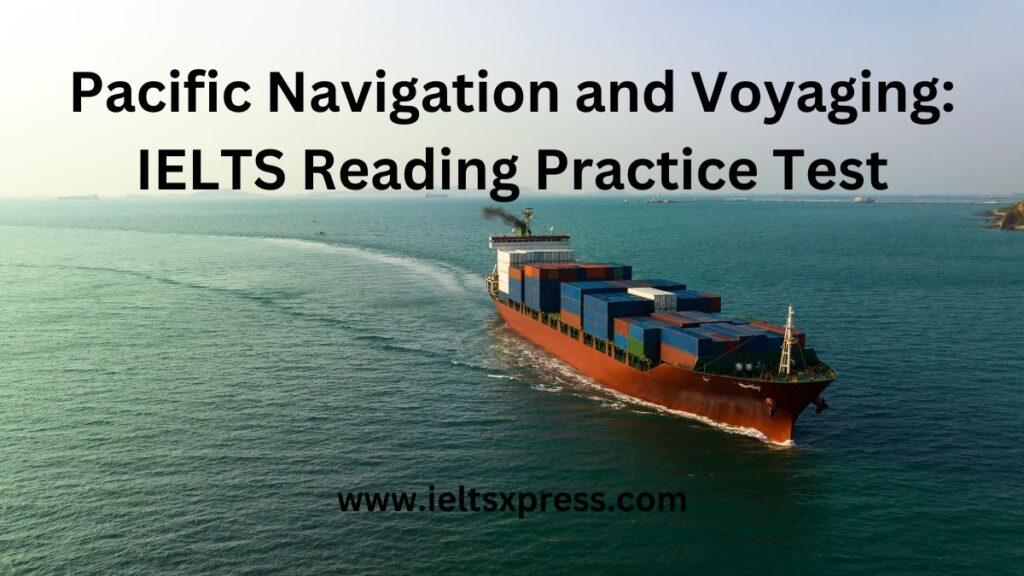
Pacific Navigation and Voyaging IELTS Reading
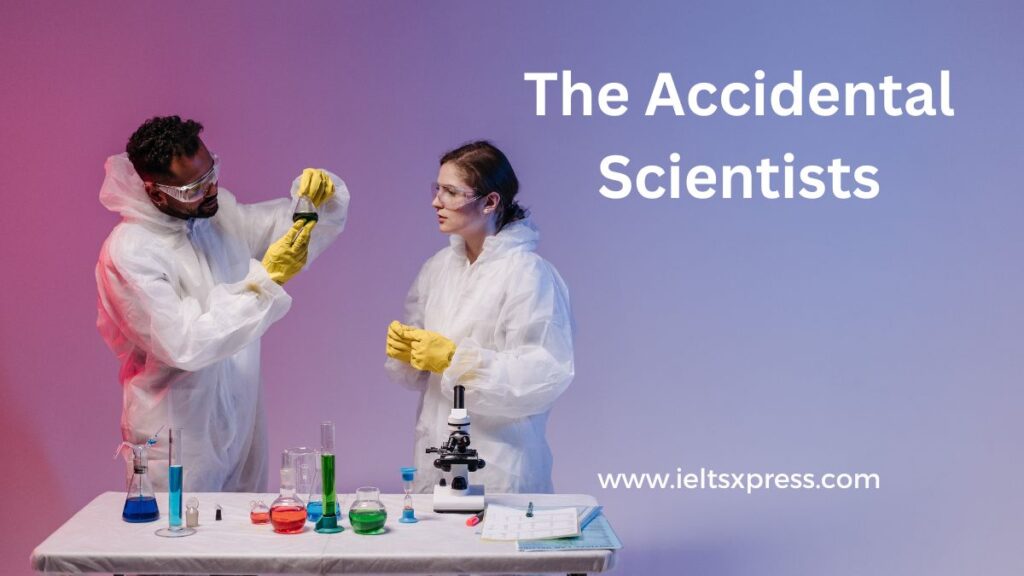
The Accidental Scientists IELTS Reading with Answers

Cambridge IELTS 18 Academic Reading Test 4
Leave a comment cancel reply.
Your email address will not be published. Required fields are marked *
Yes, add me to your mailing list
Start typing and press enter to search
IELTS Speaking Part 1 Space Travel
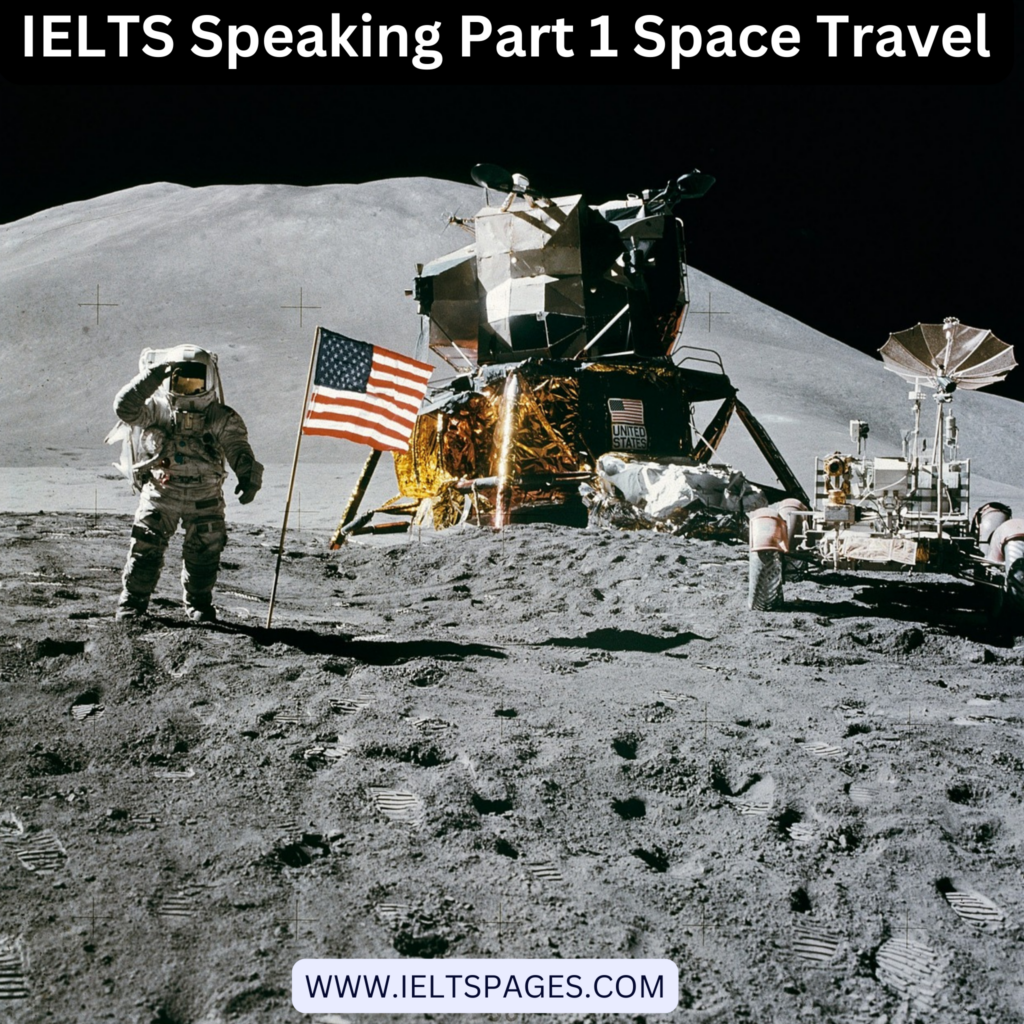
Do you like to travel by air?
Yes, I love to travel by air because I have been to many places and prefer planes. There are some reasons like it’s more convenient and time-saving and we can get it quickly and travel over a short period.
What do you think about travelling to outer space?
Outer space is a good experience for anyone who loves travelling outside. Definitely, yes, I would like to travel if I get an opportunity because we can learn a lot of things from outer space, like how the Earth looks from outer space from space and how our moon and our solar system work, and what the temperature of the sun over there we can like to get information regarding this through space travel.
Who would you like to go with if you are going on space travel?
If I could go out to space, I would prefer my mother because my mother is a science teacher and has a keen interest in outer space activities. She used to teach science to students, so I would go there with my mother.
Is it necessary to see other planets?
Of course, it’s essential to see other planets, and like I said, we can get a lot of information from the other planets, like they recently discovered, like the water level on Mars.
Now they plan to travel over there; apart from that, we can learn how time passes. It’s an excellent way to explore more things, and if a student can learn to explore outer space and other planets, they will do something about this over their study.
What do you think are the benefits of space explanation for humanity?
The benefits we can take from the outer space study are learning about outer space. We can get information like whether it would be life possible in the future over there or not or whether we, the Earth, are now on the verge of destruction, and I think it will help humanity to do something about our Earth, and yes, that’s it.
Do you believe that space travel should be a priority for governments?
Every government should only implement it for some. A specific person, like astronauts, who know about outer space and can bear zero gravity level, and so they only, I think, deserve to go to outer space compared to others.
Can you describe any recent advancements in space technology that have caught your attention?
I heard in Elon Musk’s interview that he said he’s preparing to send people to Mars maybe this year or next year at the start. Apart from that, like the Japanese rocket, it blew up in space before reaching its destination, so these two pieces of space news caught my attention.
How might space travel impact the future of our planet Earth?
Like our scientists, they are like found in I eagerly finding water on other plants, and they will be very close in the future. They will see water on some other plants, and they may travel over there. Mars would be a high priority, as would other plans, too.
How do you think space tourism will evolve in the coming years?
I see the current scenario. Space travel will become a growing industry in the future because more and more people are now like as they are familiar as they are now familiar with outer space. They eagerly want to travel in space so that it will increase in the future.

- Skip to primary navigation
- Skip to main content
- Skip to primary sidebar
IELTS Training with Jonathan
Helping Busy People Succeed in IELTS.
How to answer – Space Travel – The Perfect Speaking Part 1 Response
By ielts-jonathan.com on 5 February 2021 0
The Perfect Speaking Part 1 Response
Space travel, did you know that the first part of the ielts speaking test can be the most difficult for candidates..
Share Pin Share Tweet 0 Shares
Not only is the candidate in a test situation, but the candidate is has to deal with listening to an examiner who may speak with an unfamiliar accent or at some speed.
But don’t despair it can also be the easiest part, and the most enjoyable.
There is a valid reason for this part of the IELTS test, and I will explain this below.
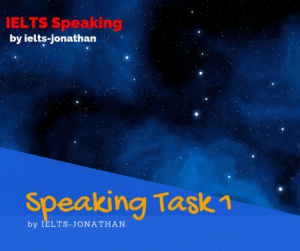
One reason for Part 1 is to ease the candidate into the test, and allow the candidate to tune into the voice of the examiner.
The three sets of questions are not particularly challenging, but are varied in topic and allow the candidate to ‘ warm up ‘ and ‘ gain confidence ‘ and additionally give the examiner ‘ a feel ‘ to immediate level.
One way to do well in this section is to relax.
A relaxed candidate always listens better and responds well.
Other tips are
- Don’t give the examiner an opportunity to ask ‘why’ you think something.
- Connect your sentences.
- Attempt to use complex sentences rather than short, simply ones.
- Don’t hesitate too much, you can make some mistakes
- Don’t be afraid to correct yourself
If you don’t understand something, always ask the examiner to repeat the question.
Think about these questions, what answer can you give,
- Do you want to travel in the outer space?
- What would you do if you had that opportunity?
- Do you think it’s necessary to see other planets?
- When was the latest time you went travelling?
- Do you like to travel by air?
TIP- IELTS Part 1 features ‘three’ random topics chosen by the examiner.
There is a around a minute of speaking time allowed for each section of part 1, so if you can answer the question fully AND extend it, you will get asked fewer questions!
I would love to travel to outer space and would jump at the opportunity if it arose. With the speed of development in current technology, it means it might happen sooner than we think! I mean Eton Musk is planning space holidays, and Jeff Bezos just recently was the first privately financed individual to go into space.
- What would you do if you had the opportunity to go into space?
In a few years it will be possible for anyone to do this. It would be great fun to experience space travel. Just to experience the feeling of being in space and weightlessness would probably be amazing.
At the moment, I think that it’s enough to experience something which we already enjoy on our own planet, there are so many opportunities. Space tourism will become a reality I believe, once the technology is in place. I think this will come from space exploration of planets for minerals and valuable materials.
At the moment, I am lucky to have had made several long haul trips to other countries. The last trip was to Beijing in the winter, it was very cold when we got off the plane.
I think travelling can be quite boring especially if you have to do a number of long-haul flights. Of course, it is quicker but I think it’s more interesting to travel by train or by bus, at least for shorter journeys. At least you can meet other people and observe the surroundings on the country you’re in.
For any of the IELTS test sections, it is important to be aware of general, current topics and developments. This can add depth to your written or spoken answers,
For more ideas about space travel there’s a recent article here on The Conversation, Will astronauts return to the moon in five years?
So, to recap, remember to relax, give full answers and connect ideas, try not to hesitate with your answer and correct yourself if you make errors or mistakes.
I’m Jonathan
I’ve taught IELTS and University English in more than a dozen universities and schools around the world.
I’m a parent, traveller and passionate about language teaching and helping students achieve their dreams.
Whilst living in Austria or working in Asia, I run IELTS courses to help students get to where they want to be.
If you are serious about IELTS, connect with me to see how I can help you.

Share this:
- Click to share on Twitter (Opens in new window)
- Click to share on Facebook (Opens in new window)
- Click to share on Pinterest (Opens in new window)
- Click to share on WhatsApp (Opens in new window)
- Click to share on Telegram (Opens in new window)
- Click to share on Tumblr (Opens in new window)
- Click to share on LinkedIn (Opens in new window)
- Click to print (Opens in new window)
Reader Interactions
Was this helpful leave a comment :) cancel reply, let me help you get the ielts result you need.

JUST WRITING FEEDBACK

Speaking Feedback
IELTS TRAINING
IELTS FEEDBACK
YOUR PRIVACY
TERMS AND CONDITIONS
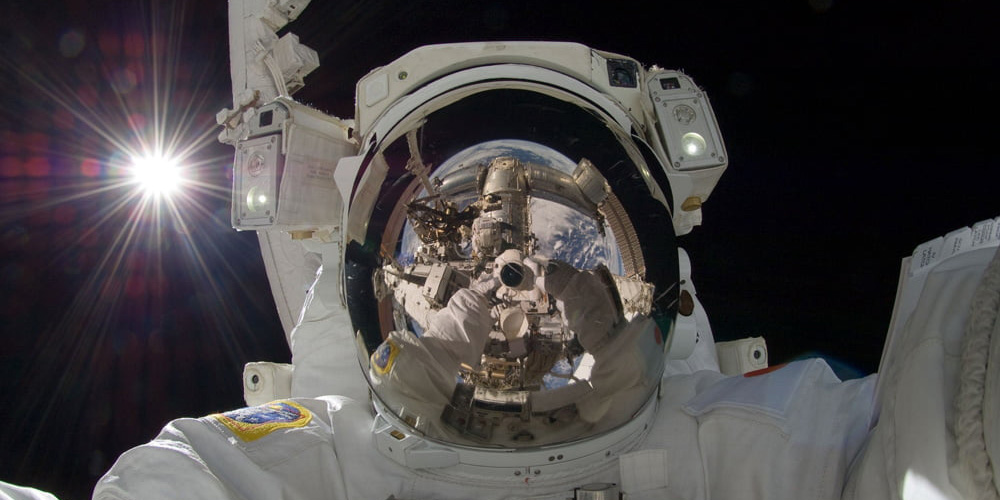
IELTS Speaking topic: Space travel
Do you want to travel in the outer space? What would you do if you had that opportunity? Do you think it’s necessary to see other planets? When was the latest time you went travelling? Do you like to travel by air?
Yes, I bet it would be very funny to travel around the outer space. Considering the current technology development and expensive cost, space travel would be memorable experience in my life.
I would like to do something that can be don on earth. I will try to fly in the air like birds, or jump long distance like a grasshopper, or even I could be the first one that set foot on the Mars.
Well, I don’t think it is very necessary to discover the other planets but humans are so curious and we are hungry for knowledge. So I believe humans will not stop seeing the other space until they find what the universe really is.
Last time, I travelled to Brisbane with my family for a 5-day winter holiday. It was very comfortable compared with other places in winter. Besides, we went hiking in the nearby forest park. It was a wonderful place full of memories and happy moments.
Not really. Travelling by air usually means long distance trip. So sitting in the limited room for hours and doing nothing but sleeping is really boring and tiring. I sometimes prefer to travel by train or drive by myself.
No Comments
This post has 0 comments, leave a reply cancel reply.
Your email address will not be published. Required fields are marked *
Email me when someone replies to my comment.

IELTS Speaking topic: A dream you have had
IELTS Speaking topic: Social network

IELTS Speaking topic: Rainy days
Search form
- Study break
Space tourism: are we one step closer?
Do you think that people will go on holiday in space in the future? Watch this video to find out how soon that could be!
Instructions
Do the preparation task first. Then watch the video and do the exercises. Remember you can read the transcript at any time.
Preparation
Could these two high-profile journeys to the edge of space by wealthy businessmen Jeff Bezos and Richard Branson mean space travel is one step closer for the rest of us?
Well, to go anytime soon, you would need a lot of money. One seat on board billionaire Jeff Bezos's rocket ship was auctioned for 28 million dollars.
Whilst there was nowhere for passengers of these two flights to stop off, the first-ever space hotel is expected to open in 2027. The Voyager Station hotel will float in low orbit, and guests will be able to see the Earth as they move round the planet.
But large rockets need lots of fuel to propel them, so space travel can have a hefty carbon footprint. Historically, rockets have been powered by kerosene, but some are now launched by using cleaner methods, such as green hydrogen.
Check your understanding: multiple selection
Check your vocabulary: gap fill, worksheets and downloads.
What do you think about space tourism? Would you like to try it?

Sign up to our newsletter for LearnEnglish Teens
We will process your data to send you our newsletter and updates based on your consent. You can unsubscribe at any time by clicking the "unsubscribe" link at the bottom of every email. Read our privacy policy for more information.
Welcome Guest!
- IELTS Listening
- IELTS Reading
- IELTS Writing
- IELTS Writing Task 1
- IELTS Writing Task 2
- IELTS Speaking
- IELTS Speaking Part 1
- IELTS Speaking Part 2
- IELTS Speaking Part 3
- IELTS Practice Tests
- IELTS Listening Practice Tests
- IELTS Reading Practice Tests
- IELTS Writing Practice Tests
- IELTS Speaking Practice Tests
- All Courses
- IELTS Online Classes
- OET Online Classes
- PTE Online Classes
- CELPIP Online Classes
- Free Live Classes
- Australia PR
- Germany Job Seeker Visa
- Austria Job Seeker Visa
- Sweden Job Seeker Visa
- Study Abroad
- Student Testimonials
- Our Trainers
- IELTS Webinar
- Immigration Webinar
Space Travel And Health- IELTS Reading Answers
11 min read
Updated On Mar 01, 2024

Share on Whatsapp
Share on Email
Share on Linkedin
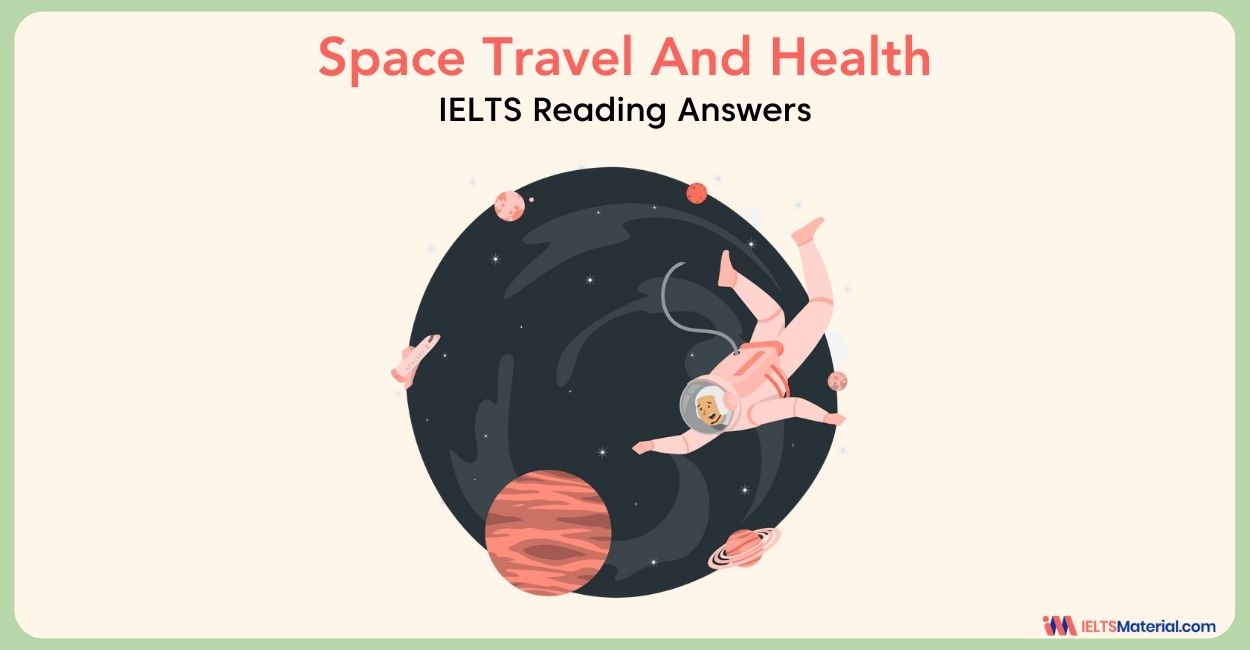
Recent IELTS Reading Test with Answers - Free PDF
In the Academic Reading practice passage, “ Space Travel and Health” , there are various question types, each of which are asked in the IELTS Reading exam. Ideally, you should not spend more than 20 minutes on a passage. Let’s see how easy this passage is for you and if you’re able to make it in 20 minutes. If not, try more IELTS reading practice tests from IELTSMaterial.com.
Reading Passage
Space travel and health.
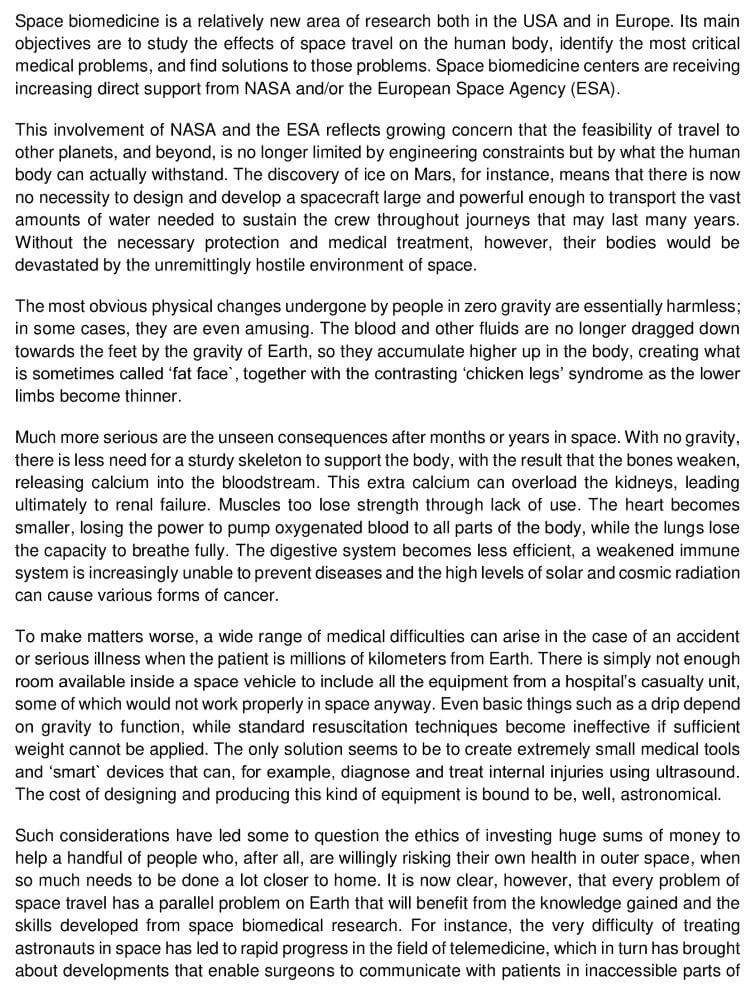
Questions of SPACE TRAVEL AND HEALTH
Reading Passage 1 has seven paragraphs A-G. Choose the correct heading for paragraphs B-E and G from the list of headings below. Write the correct member (i-x) in boxes 1—5 on your answer sheet.
List of Headings
- The problem of dealing with emergencies in space
- How space biomedicine can help patients on Earth
iii. Why accidents are so common in outer space
- What is space biomedicine?
- The psychological problems of astronauts
- Conducting space biomedical research on Earth
vii. The internal damage caused to the human body by space travel
viii. How space biomedicine First began
- The visible effects of space travel on the human body
- Why space biomedicine is now necessary
Example Paragraph A Answer iv
- Paragraph B
- Paragraph C
- Paragraph D
- Paragraph E
Example Paragraph F Answer ii
- Paragraph G
Questions 6 and 7
6 Where, apart from Earth, can space travelers find water? ………….
7 What happens to human legs during space travel? ……………..
Questions 8-12
Do the following statements agree with the writer’s views in Reading Passage 1? Write
YES if the statement agrees with the views of the writer
NO, if the state does not agree with the views of the writer
NOT GIVEN if there is no information about this in the passage
8 The obstacles to going far into space are now medical, not technological.
9 Astronauts cannot survive more than two years in space.
10 It is morally wrong to spend so much money on space biomedicine.
11 Some kinds of surgery are more successful when performed in space.
12 Space biomedical research can only be done in space.
Questions 13-14
Research area
Application in space
Application on Earth
Telemedicine
treating astronauts
13 ……….. in remote areas
Sterilization
sterilizing wastewater
14 …………….in disaster zones
Miniaturization
saving weight
wearing small monitors comfortably
Reading Answer
1 Answer: x
Question type: Matching Headings
Answer location: Paragraph B
Answer explanation: Paragraph B illustrates, “This involvement of NASA and the ESA reflects growing concern that the feasibility of travel to other planets, and beyond, is no longer limited by engineering constraints but by what the human body can actually withstand. The discovery of ice on Mars, for instance, means that there is now no necessity to design and develop a spacecraft large and powerful enough to transport the vast amounts of water needed to sustain the crew throughout journeys that may last many years. Without the necessary protection and medical treatment, however, their bodies would be devastated by the unremittingly hostile environment of space.” We can deduce from these lines that the feasibility of traveling to other planets is no longer confined by engineering constraints but by what the human body can actually withstand. However, in the last line of the paragraph, it is revealed that without necessary protection and medical treatment, the bodies will be destroyed by the hostile environment of space. As a result, space biomedicine is very important. Thus, the answer is x.
2 Answer: ix
Answer location: Paragraph C
Answer explanation: The initial lines of paragraph C state that the most obvious physical changes undergone by people in zero gravity are essentially harmless ; in some cases, they are even amusing . The blood and other fluids are no longer dragged down towards the feet by the gravity of Earth , so they accumulate higher up in the body, creating what is sometimes called ‘fat face`, together with the contrasting ‘chicken legs’ syndrome as the lower limbs become thinner. These lines suggest that the physical changes of a person in zero gravity are harmless and are sometimes amusing too. Thus, it is clear that paragraph C explains the visible effects of space travel on the human body. Therefore, the answer is ix.
3 Answer: vii
Answer location: Paragraph D
Answer explanation: Paragraph D states that much more serious are the unseen consequences after months or years in space. With no gravity, there is less need for a sturdy skeleton to support the body , with the result that the bones weaken, releasing calcium into the bloodstream . This extra calcium can overload the kidneys, leading ultimately to renal failure . Muscles too lose strength through lack of use. The heart becomes smaller, losing the power to pump oxygenated blood to all parts of the body, while the lungs lose the capacity to breathe fully. The digestive system becomes less efficient , a weakened immune system is increasingly unable to prevent diseases and the high levels of solar and cosmic radiation can cause various forms of cancer . We understand that paragraph D elucidates the possible effects and diseases that a human body living in space would have. As a result, the paragraph discusses the internal damage caused to the human body by space travel. Thus, the answer is vii.
4 Answer: i
Answer location: Paragraph E
Answer explanation: In paragraph E, it is mentioned that to make matters worse, a wide range of medical difficulties can arise in the case of an accident or serious illness when the patient is millions of kilometers from Earth. There is simply not enough room available inside a space vehicle to include all the equipment from a hospital’s casualty unit , some of which would not work properly in space anyway . Even basic things such as a drip depend on gravity to function, while standard resuscitation techniques become ineffective if sufficient weight cannot be applied. The only solution seems to be to create extremely small medical tools and ‘smart` devices that can , for example, diagnose and treat internal injuries using ultrasound . The cost of designing and producing this kind of equipment is bound to be, well, astronomical. These lines indicate the problems of dealing with emergencies in space, for instance, even a drip depends on gravity to function while resuscitation techniques are ineffective if weight is not applied. Moreover, there’s no room for more medical equipment in the space. Thus, the answer is i.
5 Answer: vi
Answer location: Paragraph G
Answer explanation: Paragraph G states the fact that nevertheless, there is still one major obstacle to carrying out studies into the effects of space travel : how to do so without going to the enormous expense of actually working in space . To simulate conditions in zero gravity , one tried and tested method is to work underwater , but the space biomedicine centers are also looking at other ideas . In one experiment, researchers study the weakening of bones that results from prolonged inactivity . This would involve volunteers staying in bed for three months , but the center is confident there should be no great difficulty in finding people willing to spend twelve weeks lying down . AII in the name of science, of course. We understand from these lines that conducting space biomedical research on Earth is difficult as it’d be challenging to do the research without actually visiting the space. As a result, space biomedicine centers are looking for other alternative ideas. Thus, the answer is vi.
6 Answer: (on/ from) Mars
Question type: Short Answer Question
Answer location: Paragraph B, line 2
Answer explanation: The 2nd line of paragraph B states that the discovery of ice on Mars, for instance, means that there is now no necessity to design and develop a spacecraft large and powerful enough to transport the vast amounts of water needed to sustain the crew throughout journeys that may last many years. We can deduce from these lines that the discovery of ice on Mars reflected that there’s no necessity of developing or designing a spacecraft to transport water required to sustain the crew. Therefore, space travelers can find water on Mars apart from the Earth. Thus, the answer is (in/on) Mars.
7 Answer: they become thinner
Answer location: Paragraph C, last line
Answer explanation: Paragraph C illustrates the obvious effects of space travel on the human body. The last line of the paragraph reveals that the blood and other fluids are no longer dragged down towards the feet by the gravity of Earth, so they accumulate higher up in the body, creating what is sometimes called ‘fat face`, together with the contrasting ‘chicken legs’ syndrome as the lower limbs become thinner . Thus, it is evident that human legs become thinner during space travel. So, the answer is they become thinner.
8 Answer: Yes
Question type: Yes/ No/ Not Given
Answer location: Paragraph A, line 2
Answer explanation: The 2nd line of paragraph A states that its main objectives are to study the effects of space travel on the human body, identify the most critical medical problems, and find solutions to those problems . These lines indicate that the primary aim of studying the effects of space travel on the human body is to identify important medical problems and find appropriate solutions to these problems. Thus, the statement agrees with the information, so, the answer is Yes.
9 Answer: Not Given
Answer location: Paragraph F
Answer explanation: We find a reference for Astronauts in Paragraph F, where it is mentioned that the very difficulty of treating astronauts in space has led to rapid progress in the field of telemedicine, which in turn has brought about developments that enable surgeons to communicate with patients in inaccessible parts of the world. These lines suggest that the difficulty of treating Astronauts in space has resulted in the progress of telemedicine. However, there’s no reference to the fact that Astronauts survive for more than two years in space. Thus, the answer is Not Given.
10 Answer: No
Answer explanation: The introductory lines of paragraph F states that such considerations have led some to question the ethics of investing huge sums of money to help a handful of people who, after all, are willingly risking their own health in outer space , when so many needs to be done a lot closer to home. These lines suggest that considerations have resulted in the ethics of investing huge amounts of money to help people who are willing to risk their own health in outer space. It is clear that people are willing to spend money on space biomedicine. Thus, the statement contradicts the information, so, the answer is No.
11 Answer: Not Given
Answer location: Paragraph E, line 2
Answer explanation: We know paragraph E explains the problems of dealing with emergencies in space. The 2nd line of paragraph E state, that there is simply not enough room available inside a space vehicle to include all the equipment from a hospital’s casualty unit , some of which would not work properly in space anyway. Even basic things such as a drip depend on gravity to function, while standard resuscitation techniques become ineffective if sufficient weight cannot be applied . The only solution seems to be to create extremely small medical tools and ‘smart` devices that can, for example, diagnose and treat internal injuries using ultrasound. These lines suggest how to deal with problems in space. It is stated that there’s no room to include much medical equipment in space, some of which wouldn’t work. Therefore, it is not mentioned anywhere in the paragraph that surgery is successful when performed in space. Thus, the answer is Not Given.
12 Answer: No
Answer explanation: Paragraph G explains conducting space biomedical research on Earth. The initial lines suggest that nevertheless, there is still one major obstacle to carrying out studies into the effects of space travel : how to do so without going to the enormous expense of actually working in space. To simulate conditions in zero gravity, one tried and tested method is to work underwater , but the space biomedicine centers are also looking at other ideas. We can deduce from these lines that there’s another tried and tested method of conducting space biomedical research, which is to work underwater. However, space biomedicine centers are looking for other alternatives. Therefore, the statement contradicts the information, so, the answer is No.
13 Answer: communicate with patients
Question type: Table Completion
Answer explanation: Paragraph F illustrates an example stating that the very difficulty of treating astronauts in space has led to rapid progress in the field of telemedicine, which in turn has brought about developments that enable surgeons to communicate with patients in inaccessible parts of the world. These lines indicate that the difficulty of treating astronauts in space has resulted in the progress of telemedicine. It has brought developments that allow surgeons to communicate with patients even in inaccessible areas. Thus, the answer is to Communicate with patients.
14 Answer: filter contaminated water
Answer explanation: Another example of sterilization can be found in paragraph F, which states that the systems invented to sterilize wastewater onboard spacecraft could be used by emergency teams to filter contaminated water at the scene of natural disaster s such as floods and earthquakes. These lines indicate that systems were invented to sterilize wastewater, which could be used by the emergency teams to filter contaminated water in disaster zones. Thus, the answer is to filter contaminated water.
Check More IELTS Reading Answers
Practice ielts reading based on question types.

Start Preparing for IELTS: Get Your 10-Day Study Plan Today!
Kasturika Samanta
Kasturika is a professional Content Writer with over three years of experience as an English language teacher. Her understanding of English language requirements, as set by foreign universities, is enriched by her interactions with students and educators. Her work is a fusion of extensive knowledge of SEO practices and up-to-date guidelines. This enables her to produce content that not only informs but also engages IELTS aspirants. Her passion for exploring new horizons has driven her to achieve new heights in her learning journey.
Explore other Reading Topics

Raajdeep Saha

Post your Comments
Recent articles.
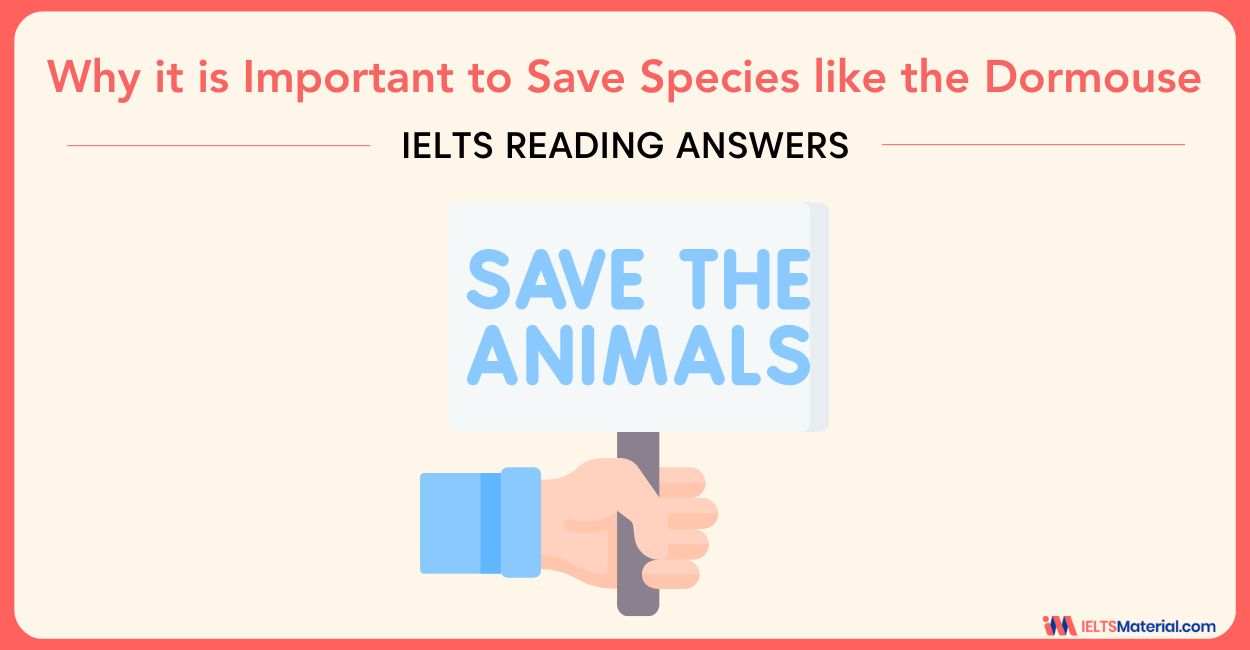
Nehasri Ravishenbagam

Our Offices
Gurgaon city scape, gurgaon bptp.
Step 1 of 3
Great going .
Get a free session from trainer
Have you taken test before?
Please select any option
Get free eBook to excel in test
Please enter Email ID
Get support from an Band 9 trainer
Please enter phone number
Already Registered?
Select a date
Please select a date
Select a time (IST Time Zone)
Please select a time
Mark Your Calendar: Free Session with Expert on
Which exam are you preparing?
Great Going!

Travel (Space Travel) & Plants Speaking Part 1 Questions With Answer
Travel (Space Travel) & Plants Speaking part 1 Questions With Answers. These are the IELTS Speaking part 1 Topics and Questions on general topics about your life. Your answers will be from your life and experience.
Travel (Space Travel) & Plants Speaking Part 1 Questions With Answer
Question 1. do you want to travel in outer space.
Answer – Frankly speaking till now, I never think about this, but I’m pretty sure that if I would get the opportunity shortly, then I would definitely like to visit any outer space since I saw in many movies that it is an adventurous task.
Question 2. What would you do if you had the opportunity?
Answer – If I would have this opportunity, then I would definitely encash this opportunity and love to visit outer space during this journey. I would click many photos as my memories, or I would take one of my best friends with me along at this.
Question 3. Do you think it’s necessary to see another planter
Answer – Well from the perspective of commoners I think it is not essential but from scientists point of view thinking about others other planets is vital since from that they come to know about many new things and many new discoveries for instance from evaluating the atmosphere at Mars scientists came to know that there is no gravity. There is the possibility of life over there so in this way we can learn many more things about other planets.
Question 4. When was the last time you went travelling?
Answer – I clearly remember last month me along with my cousins, had a trip to Manali where we saw many pilgrims and enjoys enjoyed ourselves a lot in the serene and tranquil valleys of Manali Anne. I believe definitely it is it was unforgettable is an unforgettable trip.
Question 5. Do you like to travel by air?
Well, I never had the opportunity to travel by plane however I’m inquisitive about this because one of my friend he is from Rich family and had many trips via plane most of the time he told me about his journeys. He made me more curious about travelling via air.
Question 6. Do you keep plants at home?
Answer – Yes, I do as at the home I have, I think, 25 posts in which I planted different kinds of plants such as colourful roses, some Lily flowers and some magnificent looking shrubs.
Question 7. What plant did you grow when you were young?
Answer – I vividly remember when I was young, I planted few roses in my garden that time, my Gran father really embraced this activity, Ann, every time he took me with them whenever WENT for gardening.
Question 8. Do you know anything about growing a plant?
Answer – Yes I do actually I learned this skill from my Gran father who was a great gardener, and he had great skills in gardening Anne most of the time I performed all these activities with them, and nowadays I think I’m capable of handling a garden efficiently will I could grow plants I believe of any species
Question 9. Do Indian people give plants as gifts?
Answer – As per my experience I don’t think people like to give plants as presents on the contrary people like to give material gifts such as watches, dresses, perfumes some usable things and so on but the plant is a scarce gift.
Follow Us on IELTSFever Instagram for more updates and the latest test tasks.
Also, Read Language & smile Speaking part 1 Questions With Answers .
- Click to share on WhatsApp (Opens in new window)
- Click to share on Pinterest (Opens in new window)
- Click to share on Facebook (Opens in new window)
- Click to share on Tumblr (Opens in new window)
- Click to email a link to a friend (Opens in new window)
- Click to share on LinkedIn (Opens in new window)
- Click to share on Twitter (Opens in new window)
- Click to share on Reddit (Opens in new window)
- Click to share on Telegram (Opens in new window)
- Click to share on Pocket (Opens in new window)
- Click to print (Opens in new window)
Pages Content
About The Author
IELTS FEVER
1 thought on “travel (space travel) & plants speaking part 1 questions with answer”.
Leave a Comment Cancel Reply
Your email address will not be published. Required fields are marked *
Notify me of follow-up comments by email.
Notify me of new posts by email.
- Full IELTS Practice Tests
- Practice Tests
Space Travel and Health
- View Solution
Solution for: Space Travel and Health
Answer table.
Found a mistake? Let us know!
Share this Practice Test
Exam Review

A. Space biomedicine is a relatively new area of research both in the USA and in Europe. Its main objectives are to study the effects of space travel on the human body, identifying the most critical medical problems, and finding solutions to those problems. Space biomedicine centers are receiving increasing direct support from NASA and/or the European Space Agency (ESA).
B. This involvement of NASA and the ESA reflects growing concern that the feasibility of travel to other planets, and beyond, is no longer limited by engineering constraints but by what the human body can actually withstand. The discovery of ice on Mars, for instance, means that there is now no necessity to design and develop a spacecraft large and powerful enough to transport the vast amounts of water needed to sustain the crew throughout journeys that may last many years. Without the necessary protection and medical treatment, however, their bodies would be devastated by the unremittingly hostile environment of space.
C. The most obvious physical changes undergone by people in zero gravity are essentially harmless; in some cases, they are even amusing. The blood and other fluids are no longer dragged down towards the feet by the gravity of Earth, so they accumulate higher up in the body, creating what is sometimes called ‘fat face`, together with the contrasting ‘chicken legs’ syndrome as the lower limbs become thinner.
D. Much more serious are the unseen consequences after months or years in space. With no gravity, there is less need for a sturdy skeleton to support the body, with the result that the bones weaken, releasing calcium into the bloodstream. This extra calcium can overload the kidneys, leading ultimately to renal failure. Muscles too lose strength through lack of use. The heart becomes smaller, losing the power to pump oxygenated blood to all parts of the body, while the lungs lose the capacity to breathe fully. The digestive system becomes less efficient, a weakened immune system is increasingly unable to prevent diseases and the high levels of solar and cosmic radiation can cause various forms of cancer.
E. To make matters worse, a wide range of medical difficulties can arise in the case of an accident or serious illness when the patient is millions of kilometers from Earth. There is simply not enough room available inside a space vehicle to include all the equipment from a hospital’s casualty unit, some of which would not work properly in space anyway. Even basic things such as a drip depend on gravity to function, while standard resuscitation techniques become ineffective if sufficient weight cannot be applied. The only solution seems to be to create extremely small medical tools and ‘smart` devices that can, for example, diagnose and treat internal injuries using ultrasound. The cost of designing and producing this kind of equipment is bound to be, well, astronomical.
F. Such considerations have led some to question the ethics of investing huge sums of money to help a handful of people who, after all, are willingly risking their own health in outer space, when so much needs to be done a lot closer to home. It is now clear, however, that every problem of space travel has a parallel problem on Earth that will benefit from the knowledge gained and the skills developed from space biomedical research. For instance, the very difficulty of treating astronauts in space has led to rapid progress in the field of telemedicine, which in turn has brought about developments that enable surgeons to communicate with patients in inaccessible parts of the world. To take another example, systems invented to sterilize wastewater onboard spacecraft could be used by emergency teams to filter contaminated water at the scene of natural disasters such as floods and earthquakes. In the same way, miniature monitoring equipment, developed to save weight in space capsules, will eventually become tiny monitors that patients on Earth can wear without discomfort wherever they go.
G. Nevertheless, there is still one major obstacle to carrying out studies into the effects of space travel: how to do so without going to the enormous expense of actually working in space. To simulate conditions in zero gravity, one tried and tested method is to work underwater, but the space biomedicine centers are also looking at other ideas. In one experiment, researchers study the weakening of bones that results from prolonged inactivity. This would involve volunteers staying in bed for three months, but the center concerned is confident there should be no great difficulty in finding people willing to spend twelve weeks lying down.AII in the name of science, of course.
Questions 1-5
Reading Passage 1 has seven paragraphs A-G. Choose the correct heading for paragraphs B-E and G from the list of headings below. Write the correct member (i-x) in boxes 1—5 on your answer sheet.
List of Headings
i. The problem of dealing with emergencies in space ii. How space biomedicine can help patients on Earth iii. Why accidents are so common in outer space iv. What is space biomedicine? v. The psychological problems of astronauts vi. Conducting space biomedical research on Earth vii. The internal damage caused to the human body by space travel viii. How space biomedicine First began ix. The visible effects of space travel on the human body x. Why space biomedicine is now necessary
Example Paragraph A Answer iv 1 i ii iii iv v vi vii viii ix x Paragraph B Answer: x 2 i ii iii iv v vi vii viii ix x Paragraph C Answer: ix 3 i ii iii iv v vi vii viii ix x Paragraph D Answer: vii 4 i ii iii iv v vi vii viii ix x Paragraph E Answer: i Example Paragraph F Answer ii 5 i ii iii iv v vi vii viii ix x Paragraph G Answer: vi
Questions 6-7
Answer the questions below using NO MORE THAN THREE WORDS for each answer. 6. Where, apart from Earth, can space travelers find water? 6 Answer: (ON/FROM) MARS 7. What happens to human legs during space travel? 7 Answer: THEY BECOME THINNER
Questions 8-12
Do the following statements agree with the writer’s views in Reading Passage? Write YES if the statement agrees with the views of the writer NO, if the state does not agree with the views of the writer NOT GIVEN if there is no information about this in the passage
8 YES NO NOT GIVEN The obstacles to going far into space are now medical, not technological. Answer: YES 9 YES NO NOT GIVEN Astronauts cannot survive more than two years in space. Answer: NOT GIVEN 10 YES NO NOT GIVEN It is morally wrong to spend so much money on space biomedicine. Answer: NO 11 YES NO NOT GIVEN Some kinds of surgery are more successful when performed in space. Answer: NOT GIVEN 12 YES NO NOT GIVEN Space biomedical research can only be done in space. Answer: NO
Questions 13-14
Complete the table below. Choose NO MORE THAN THREE WORDS from the passage for each answer
Other Tests
- 5 - YES-NO-NOT GIVEN
- 4 - Matching Information
- 5 - Sentence Completion
Personality and appearance
- Recent Actual Tests
- 0 unanswered
The Plan to Bring an Asteroid to Earth
- 6 - TRUE-FALSE-NOT GIVEN
- 7 - Summary, form completion
The history of tea
The history of dolls.
- 9 - TRUE-FALSE-NOT GIVEN
- 5 - Summary, form completion
The Bite That Heat
- 5 - TRUE-FALSE-NOT GIVEN
- 4 - Sentence Completion
- 4 - Summary, form completion
The dugong: sea cow
Found a mistake let us know.
Please descibe the mistake as details as possible along with your expected correction, leave your email so we can contact with you when needed.
Describe what is wrong with the practice test:
Please enter description
Enter your name:
Enter your email address:
Please enter a valid email

- Practice Test
- Useful Tips – Tricks
- Full Writing Review
- General Writing Task
- Writing Task 1
- Writing Task 2
- Writing Exercises
- Writing Sample – Topics
- Writing Vocabulary
- Speaking Vocabulary
- Intro Question
- Speaking Part 1
- Speaking Part 2
- Speaking Part 2 – Audio
- Speaking Part 3
- IELTS Books
- Recent Exams
- IELTS Vocabulary
- Essay from Examiners
- IELTS Ideas

IELTS Reading Practice 70: Space: The Final Archaeological Frontier
Space: the final archaeological frontier.
Space travel may still have a long way to go, but the notion of archaeological research and heritage management in space is already concerning scientists and environmentalists.
In 1993, University of Hawaii’s anthropologist Ben Finney, who for much of his career has studied the technology once used by Polynesians to colonize islands in the Pacific, suggested that it would not be premature to begin thinking about the archaeology of Russian and American aerospace sites on the Moon and Mars. Finney pointed out that just as today’s scholars use archaeological records to investigate how Polynesians diverged culturally as they explored the Pacific, archaeologists will someday study off-Earth sites to trace the development of humans in space. He realized that it was unlikely anyone would be able to conduct fieldwork in the near future, but he was convinced that one day such work would be done. There is a growing awareness, however, that it won’t be long before both corporate adventurers and space tourists reach the Moon and Mars. There is a wealth of important archaeological sites from the history of space exploration on the Moon and Mars and measures need to be taken to protect these sites. In addition to the threat from profit- seeking corporations, scholars cite other potentially destructive forces such as souvenir hunting and unmonitored scientific sampling, as has already occurred in explorations of remote polar regions. Already in 1999 one company was proposing a robotic lunar rover mission beginning at the site of Tranquility Base and rumbling across the Moon from one archaeological site to another, from the wreck of the Ranger S probe to Apollo 17 s landing site. The mission, which would leave vehicle tyre- marks all over some of the most famous sites on the Moon, was promoted as a form of theme-park entertainment. According to the vaguely worded United Motions Outer Space Treaty of 1967. what it terms ‘space junk’ remains the property of the country that sent the craft or probe into space. But the treaty doesn’t explicitly address protection of sites like Tranquility Base, and equating the remains of human exploration of the heavens with ‘space junk’ leaves them vulnerable to scavengers. Another problem arises through other international treaties proclaiming that land in space cannot be owned by any country or individual. This presents some interesting dilemmas for the aspiring manager of extraterrestrial cultural resources. Does the US own Neil Armstrong’s famous first footprints on the Moon but not the lunar dust in which they were recorded? Surely those footprints are as important in the story of human development as those left by hominids at Laetoli, Tanzania. But unlike the Laetoli prints, which have survived for 3.5 million years encased in cement-like ash. those at Tranquility Base could be swept away with a casual brush of a space tourist’s hand. To deal with problems like these, it may be time to look to innovative international administrative structures for the preservation of historic remains on the new frontier. The Moon, with its wealth of sites, will surely be the first destination of archaeologists trained to work in space. But any young scholars hoping to claim the mantle of history’s first lunar archaeologist will be disappointed. That distinction is already taken. On November 19. 1969. astronauts Charles Conrad and Alan Bean made a difficult manual landing of the Apollo 12 lunar module in the Moon’s Ocean of Storms, just a few hundred feet from an unmanned probe. Surveyor J. that had landed in a crater on April 19. 1967. Unrecognized at the time, this was an important moment in the history of science. Bean and Conrad were about to conduct the first archaeological studies on the Moon. After the obligatory planting of the American flag and some geological sampling, Conrad and Bean made their way to Surveyor 3. They observed that the probe had bounced after touchdown and carefully photographed the impressions made by its footpads. The whole spacecraft was covered in dust, perhaps kicked up by the landing. The astronaut-archaeologists carefully removed the probes television camera, remote sampling arm. and pieces of tubing. They bagged and labelled these artefacts, and stowed them on board their lunar module. On their return to Earth, they passed them on to the Daveson Space Center in Houston, Texas, and the Hughes Air and Space Corporation in EI Segundo, California. There, scientists analyzed the changes in these aerospace artefacts. One result of the analysis astonished them. A fragment of the television camera revealed evidence of the bacteria Streptococcus mitis. I or a moment it was thought Conrad and Bean had discovered evidence for life on the Moon, but after further research the real explanation became apparent. While the camera was being installed in the probe prior to the launch, someone sneezed on it. The resulting bacteria had travelled to the Moon, remained in an alternating freezing.’ boiling vacuum for more than two years, and returned promptly to life upon reaching the safety of a laboratory back on Earth. The finding that not even the vastness of space can stop humans from spreading a sore throat was an unexpected spin-off. But the artefacts brought back by Rean and Conrad have a broader significance. Simple as they may seem, they provide the first example of extraterrestrial archaeology and perhaps more significant for the history of the discipline formational archaeology, the study of environmental and cultural forces upon the life history of human artefacts in space. Questions 28-33 Complete each sentence with the correct ending A-H from the box below. Write the correct letter A-H in boxes 28-33 on your answer sheet.
28. Ben Finney’s main academic work investigates the way that 29. Ben Finney thought that in the long term 30. Commercial pressures mean that in the immediate future 31. Academics are concerned by the fact that in isolated regions on Earth. 32. One problem with the 1967 UN treaty is that 33. The wording of legal agreements over ownership of land in space means that A. activities of tourists and scientists have harmed the environment. B. some sites in space could be important in the history of space exploration. C. vehicles used for tourism have polluted the environment. D. it may be unclear who has responsibility for historic human footprints. E. past explorers used technology in order to find new places to live.
F. man-made objects left in space are regarded as rubbish. G. astronauts may need to work more closely with archaeologists. H. important sites on the Moon may be under threat. Questions 34-38 Complete the flow chart below. Choose NO MORE THAN ONE WORD from the passage for each answer. During the assembly of the Surveyor 3 probe, someone 34 ………………….. on a TV camera. ↓ The TV Camera was carried to the Moon on Surveyor 3 ↓ The TV Camera remained on the Moon for over 35 ………………….. years ↓ Apollo 12 astronauts 36 ………………….. the TV camera ↓ The TV camera was returned to Earth for 37 ………………….. ↓ The Streptococcus mitis bacteria were found. ↓ The theory that this suggested there was 38 ………………….. on the Moon was rejected. ↓ Scientists concluded that the bacteria can survive lunar conditions. Questions 39-40 Choose TWO letters A-E The TWO main purposes of the writer of this text are to explain A. the reasons why space archaeology is not possible. B. the dangers that could follow from contamination of objects from space. C. the need to set up careful controls over space tourism. D. the need to preserve historic sites and objects in space. E. the possible cultural effects of space travel.
28. E 29. B 30. H 31. A 32. F 33. D 34. sneezed 35. 2 36. removed 37. analysis 38. life 39. & 40. C, D [in either order]
Leave a Reply Cancel reply
Latest posts, ielts reading practice 118: henry moore (1898-1986), ielts reading practice 117: the return of the huarango, ielts reading practice 116: the secret of staying young.

IELTS App - For Mobile
Ready for the IELTS exam with our IELTS app. Over 2 million downloads

Popular Last 24h
Describe a person whom you met for the first time and made you happy, in many countries,today there are many highly qualified graduates without employment., ielts speaking part 1 : accommodation, two-way discussion : family, listening full test 1 - section 1, ielts speaking part 1 : photographs (question-answer), ielts speaking part 3: internet.
- IELTS Test/Skills FAQs
- IELTS Scoring in Detail
- Forecast Speaking – 2023
- List IELTS Speaking Part 3
- List IELTS Speaking Part 1
- IELTS Writing 2023 – Actual Test
Our Telegram
Join our community for IELTS preparation and share and download materials.
The information on this site is for informational purposes only. IELTS is a registered trademark of the University of Cambridge ESOL, the British Council, and IDP Education Australia. This site and its owners are not affiliated, approved or endorsed by University of Cambridge ESOL, the British Council, or IDP Education Australia.
Latest Articles
Ielts speaking part 3: topic teamwork, describe a time when someone did well in a team, writing task 2: problem and solution, writing task 2: government| health care vs tax-payers, writing task 1: languages learned by two genders, most popular, describe a film that made you laugh, topic: experience is the best teacher, describe something difficult you would like to succeed in doing.
ieltspracticeonline All Rights Reserved

Space Travel has been Possible for Some Time, and Could be Developed in The Future - Task 2 Band 9
You should spend about 40 minutes on this task.
Write about the following topic:
Space travel has been possible for some time, and some people believe that space tourism could be developed in the future.
Do you think it is a positive or negative development?
Give reasons for your answer and include any relevant examples from your own knowledge and experiences.
You should write at least 250 words.

Get your personalised IELTS Essay Feedback from a former examiner
Download IELTS eBooks , get everything you need to achieve a high band score
Model Essay 1
The prospect of space tourism, a notion once confined to the realms of science fiction, has transitioned into a feasible future development. This essay posits that the evolution of space tourism represents a positive advancement, focusing on the catalyzation of technological progress and the fostering of international cooperation. The ensuing paragraphs will elaborate on these pivotal aspects.
Firstly, the drive towards making space travel accessible to tourists necessitates significant technological innovation, serving as a catalyst for advancements across various sectors, thus enriching human life on Earth and beyond. For instance, the quest for more efficient propulsion systems could precipitate breakthroughs in energy conservation, benefitting not only space travel but also terrestrial transportation methods, making them more sustainable and efficient. Moreover, the development of sustainable life-support systems in space could have parallel applications on Earth, particularly in enhancing recycling technologies and promoting sustainable living practices, thereby contributing to environmental preservation and sustainability.
Secondly, space tourism holds the potential to bolster international collaboration significantly. The enormity of investment and the complexity of technology required for space exploration have historically encouraged nations to work together, as seen in the collaborative success of the International Space Station project. Space tourism could extend this cooperative spirit, fostering a sense of global unity and shared responsibility for our celestial surroundings, and inspiring a new era of international partnership. As tourists from diverse backgrounds experience the overview effect— the profound realization of Earth's fragility and the interconnectedness of all life— it may also galvanize a collective effort towards addressing global challenges such as climate change, thus uniting humanity in a common cause for preservation and understanding.
In conclusion, the advent of space tourism heralds a significant positive development. By driving technological innovation and promoting international cooperation, it has the potential to yield benefits far beyond the exhilaration of space travel. It fosters a forward-looking vision where the boundaries of human achievement extend into the cosmos, urging us to think beyond our planetary confines and work together for a better future.
Model Essay 2
The notion of space tourism, once a futuristic fantasy, is swiftly becoming an achievable reality, heralding a new era in human exploration and innovation. This essay asserts that the development of space tourism is a positive phenomenon, underscoring the potential for significant advancements in technology and the enhancement of global unity. The discussion will delve into the technological benefits and the fostering of international relations.
Technological innovation, driven by the ambition of space tourism, stands as a cornerstone for this positive development. The challenge of creating vehicles capable of ferrying tourists beyond Earth's atmosphere accelerates research in propulsion and sustainable life systems. Such advancements promise not only to revolutionize space travel but also to offer substantial terrestrial applications, from improved energy solutions to advanced materials. For example, the miniaturization of space technology could lead to more efficient consumer electronics, while advancements in spacecraft safety protocols could enhance systems on Earth, making everyday transportation modes safer and more reliable.
Furthermore, space tourism paves the way for unprecedented international cooperation. The complexity and cost of space exploration have traditionally necessitated a collaborative approach among nations, a trend that space tourism is set to amplify. This collective endeavor could foster a stronger global community, united by the shared goal of exploring and understanding space. The shared experiences of astronauts, viewing Earth without borders, have already highlighted our planet's vulnerability and interconnectedness. Space tourism will allow civilians to experience this 'overview effect,' potentially leading to a global shift in perspective towards unity and environmental stewardship.
In conclusion, space tourism embodies a positive stride forward for humanity, with the potential to ignite technological revolutions and solidify global solidarity. By pushing the boundaries of what is technologically possible and fostering a unified approach to exploration, space tourism sets the stage for a future where our sights, both literally and metaphorically, are set beyond the horizons of our world.
Model Essay 3
Space travel, once a distant dream, is now verging on the realm of reality for not just astronauts, but potentially for tourists too. The advent of space tourism is a development I view as exceedingly positive, for it not only epitomizes human innovation but also holds the promise of profound societal impacts.
Primarily, space tourism represents a pinnacle of technological achievement. This venture isn't just about sending a few privileged individuals into orbit; it's a testament to human ingenuity and the relentless pursuit of knowledge. The technologies developed for space travel, such as advanced propulsion systems and sustainable life-support systems, have far-reaching implications. For instance, the miniaturization of technology necessary for space travel can revolutionize medical devices, making them more accessible and efficient. Imagine a future where pacemakers or insulin pumps are as small and efficient as the gadgets designed for space – a direct benefit stemming from space exploration technology.
Furthermore, space tourism can ignite a global sense of unity and environmental consciousness. The 'Overview Effect', experienced by astronauts who view Earth from space, leads to a profound understanding of our planet's vulnerability. As space tourism becomes accessible, more people experiencing this effect could lead to a collective shift in how we address global challenges like climate change. Envision a world where the shared experience of seeing Earth's fragile atmosphere from space fosters a stronger commitment to its preservation.
Lastly, the economic implications of space tourism are significant. It's not merely about the wealthy experiencing the thrill of space; it's about the jobs and economic opportunities created in the process. From engineers to hospitality staff in space hotels, a new industry means new careers, driving economic growth and innovation.
In conclusion, space tourism is an endeavour that pushes the boundaries of our capabilities, broadens our understanding of the universe, and brings tangible benefits to society. The value of such a development extends far beyond the stars – it reaches into the very core of human advancement and our collective future.
Model Essay 4
A school of thought holds that people would have chance to travel to other planets in the future. While, to some extent, this thinking may work, I would contend that it is overall a negative development.
It is understandable why some people subscribe to the view that space travel offers scores of benefits, as this would allow people, scientists, astronauts, and astronomers research deeply and gain better understanding about other planets through hands-on experiences, rather than merely depending on technologies, such as radar, telescope etc. In addition to this, space travel would help people not only broaden their horizon about the universe but also allow them to find out the other life forms outside the Earth, which may benefit future generations in term of survival.
Nevertheless, I am convinced that travelling by spacecraft would do more harm than good, because this would cost a colossal amount of money, whereas there are other urgent issues on Earth that need to be addressed at first. As hunger and unemployment have become rampant in many parts of the world, many countries are in dire need of funding for revitalizing their economies or raising a minimum standard of living. Compared to these immediate needs, paying too much time and money on space tourism seems like an unworthy cause. Moreover, space travel is likely to be a very dangerous initiative. Boarding a space craft and travelling through the universe tend to include a variety of potential life-threatening accidents and emergency situations for the travellers.
In conclusion, although there are some benefits that space tourism could offer to scientific endeavours, I am still of the opinion that it is a negative development in terms of both safety and the monumental expenses that it incurs.
- Task 2 Essays
Related Posts
Water Pollution Has Become an Increasing Problem Over the Past Few Decades - IELTS Essay
Governments Should Lower Arts Budgets to Allocate More Money to Education - IELTS Essay
Modern Technology Now Allows Rapid and Uncontrolled Access to Information - IELTS Essay
IELTS Preparation with Liz: Free IELTS Tips and Lessons, 2024
- Test Information FAQ
- Band Scores
- IELTS Candidate Success Tips
- Computer IELTS: Pros & Cons
- How to Prepare
- Useful Links & Resources
- Recommended Books
- Writing Task 1
- Writing Task 2
- Speaking Part 1 Topics
- Speaking Part 2 Topics
- Speaking Part 3 Topics
- 100 Essay Questions
- On The Day Tips
- Top Results
- Advanced IELTS
Space Exploration Questions
Essay questions for the topic of space exploration in IELTS writing task 2.
Some scientists think that there are intelligent life forms on other planets and messages should be sent to contact them. Other scientists think it is a bad idea and would be dangerous. Discuss both views and give your own opinion. (2017, 2022)
The government is spending a lot of money to discover life on other planets. Some people think that government is wasting money and should spend more money addressing the problems of public. To what extent do you agree? (2017, 2020)
Some people think that space exploration is a waste of resources, while others think that it is essential for mankind to continue to explore the universe in which we live. Discuss both sides and give your opinion. (appears most years in the test)
Reported essay questions are from students who have taken their IELTS test. These questions may vary slightly in wording from the original question.
All practice IELTS Essay Questions
- Over 100 IELTS Essay Questions
Advanced IELTS Lessons & E-books

Recent Lessons
Ielts speaking part 2 topic water sports: vocab & model answer, ielts liz personal update 2024, ielts model essay -two questions essay type, ielts bar chart of age groups 2024, ielts topic: urban planning, ielts listening transcripts: when and how to use them.

Click Below to Learn:
- IELTS Test Information
Copyright Notice
Copyright © Elizabeth Ferguson, 2014 – 2024
All rights reserved.
Privacy Policy & Disclaimer
- Click here: Privacy Policy
- Click here: Disclaimer
Return to top of page
Copyright © 2024 · Prose on Genesis Framework · WordPress · Log in
- IELTS Books
- Speaking Part 1
- Speaking Part 2
- Speaking Part 3
- Multiple charts
- Opinion Essays
- Discussion Essays
- Problem Solution Essays
- Advantages & Disadvantages Essays
- Double Question Essays
- Formal Letter
- Informal/personal Letter
- Semi-formal Letter

IELTS Vocabulary: Topic SPACE EXPLORATION
SPACE EXPLORATION is a common topic in IELTS. Here is a list of words that you need to know to get a good score.
1. The space race Meaning: competition between the US and the Soviet Union in the 1950s and 60s to be the first to explore space Example: The space race in the 1950s marks an important point in the development of space exploration
2. A space probe Meaning: a type of space craft that does not have a person inside Example: Space probes can be sent to far distances for long periods of time to gather information about different areas in space.
3. A lunar module Meaning: a small craft used for travelling between the moon and the larger space craft orbiting the moon. Example: When the first men walked on the moon they came out of the lunar module . The first man to walk on the moon said “One small step for a man, one giant leap for mankind.
4. To put into orbit Meaning: To send something into space, following a curved path of a planet or an object as it moves around a star, a moon or a planet Example: A new satellite has been put into orbit around the earth
5. Manned space flight Meaning: a voyage into space which has a person to control it Example: As manned space flights are so dangerous, many checks must be carried out first
6. To launch a space rocket Meaning: to send a rocket into space Example: Nowadays, men launch space rockets – not ships – to discover new worlds
7. The cosmos Meaning: the universe, especially when it is thought of as an ordered system Example: Although the challenge of exploring and understanding thecosmos is exciting, it is also very expensive
8. To pour money into space research Meaning: to spend enormous amounts of money on space research Example: Some people argue that it is wasteful to pour money into space research.
9. A test flight Meaning: a flight during which a space craft or part of its equipment is tested Example: Test flights add to the huge costs of space exploration.
10 . A space shuttle Meaning: a spacecraft designed to be used, for example, to travel between the earth and a space station Example: The first space shuttle was front-page news, but now people are no longer excited by the concep
11. A space station Meaning: a large structure that is sent into space and remains above the earth as a base for people working and travelling in space Example: Even maintaining an international space station is so expensive that the costs must be shared by several countries.
12. Space vogages Meaning: journeys into space Example: Public interest in the early space voyages was unprecedented.
13 . Space tourism Meaning: travelling to space as a form of vacation/holiday Example: Billionaires are the only people who are likely to experience space tourism in the foreseeable future.
14. To discover the mysteries of the universe Meaning: to find out more about space Example: Space exploration is an essential element in our attempt to discover the mysteries of the universe
15. Space missions Meaning: flights into space Example: Recent space missions have begun to explore Mars and more distant parts of the universe.
16. The conquest of space Meaning: the act of gaining control over the difficult task of exploring space Example: The conquest of space is a challenge that continues to inspire the public imagination
17. To be an inspiration to Meaning: to make somebody excited about something, especially thinking of the future Example: The images of the first men on the moon were an inspiration to people, and made them more hopeful about the future.
18. Spacesuits and helmets Meaning: the clothing worn by astronauts. Example: Astronauts must find it difficult to carry out maintenance tasks during space flights wearing uncomfortable spacesuits and helmets. |
19. Vacuum-packed food Meaning: a space that is completely empty of all substances, including all air or other gas Example: During manned space flights, astronauts have to live off vacuum packed food.
20. Weightless conditions Meaning; having no weight or appearing to have no weight. As a result, astronauts appear to float in space. Example: Astronauts work in weightless conditions , which must make even routine tasks very difficult.
21. To endure hardships and discomforts Meaning: to experience and deal with conditions that are unpleasant Example: I doubt that space tourism will have mass appeal in the future. Travellers would have to endure hardships and discomforts such as weightless conditions, vacuum-packed food and wearing spacesuits and helmets.
22. To float through space Meaning: to move slowly in the air Example: Space tourism would be really boring, simply floating through space and looking out of the window of the spacecraft.
23. Zero gravity Meaning: having no force to pull objects to the ground, so that they float. Example: Living in conditions of zero gravity in space must be extremely tiring and uncomfortable.
24. Satellite technology Meaning: the technology of sending electronic devices into space for communications purposes Example: Satellite technology has resulted in huge advances in communications and information-gathering.
25. A spin-off Meaning: a useful result of an activity that was designed to produce something different Explanation: Space programs have produced spin-offs that have revolutionized modern life, such as satellite television and communications.
26. To make space travel commercially viable Meaning: to make space travel a success financially Example: Holidays in space are just fantasy. It is doubtful if it will ever be possible to make space travel commercially viable.
27. The quest for a new homeland Meaning: the search for a new place to inhabit Example: As humans are destroying their own planet, the quest for a new homeland in the universe is essential.
28. Alien life forms Meaning: creatures from another world Example: One of the most exciting possibilities of the space program is finding alien life forms on other planets.
29. Extraterrestrial life Meaning: life that may exist on another planet Example: The quest for extraterrestrial life will prove that humans are not alone in the universe.
30. In the realm of science fiction Meaning: only possible in science fiction stories, only fantasy Example: Most of the arguments in favour of space programs are in the realm of science fiction.
Leave a Reply Cancel reply
#1 ielts app, most popular 24h, [2021] download cambridge ielts 16 books pdf+ audio, ielts speaking part 3 topic : free time & hobbies, [2023] cambridge ielts 18 academic pdf and audio, ielts speaking part 3 topic : travelling, describe your dream job, ielts vocabulary: topic family and children.
50 Latest Space IELTS Topics
- Unlimited Task 1 checks Get all the feedback you need to keep improving your charts and letters.
- Unlimited Task 2 checks Practice and perfect your skills with essays.
- Personalized suggestions Know how to boost your score.
- Detailed mistakes analysis Get instant feedback. Spot every mistake.
- Topic ideas generator Get topic-specific ideas to enhance your writing.
- Vocabulary helper Get the right words for any topic.
- Progress tracking Track your writing improvements.
Space travel and health Answers and Questions
The Blog post contains the following IELTS Reading Questions :
- IELTS Reading Yes/No/Not given
- IELTS Reading Matching headings
- IELTS Reading Sentence completion
Stay informed and prepared for success – Explore our comprehensive Reading Test Info page to get valuable insights, exam format details, and expert tips for mastering the IELTS Reading section .
IELTS Reading Passage: Space travel and health
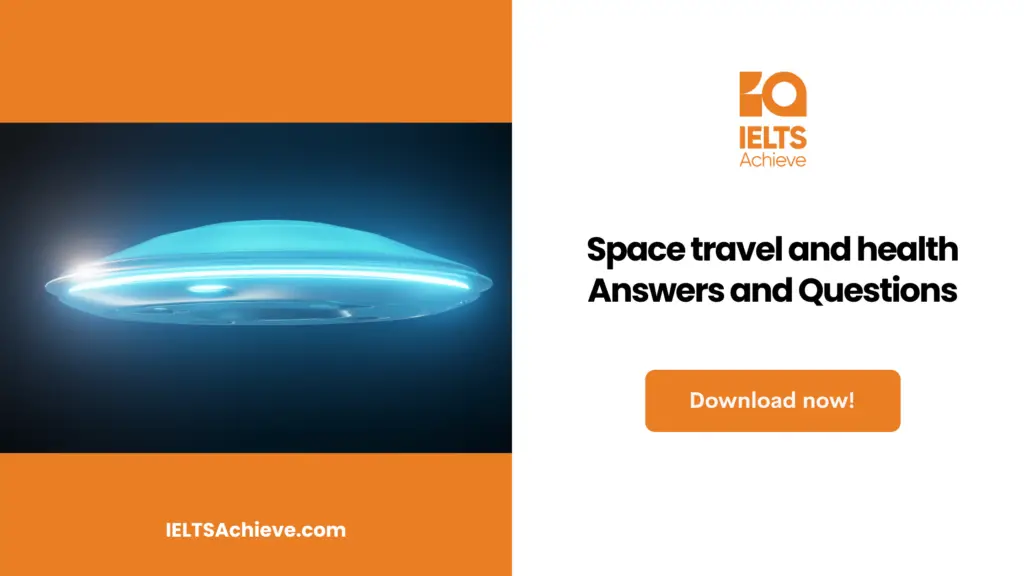
Space travel and health
A. Both in the United States and Europe, space biomedicine is a relatively new field of study. Its primary goals are to investigate how space travel affects the human body, pinpoint the most pressing medical issues, and come up with solutions for those issues. NASA and/or the European Space Agency are providing more direct funding to space biomedicine centres. (ESA).
B. NASA and the ESA’s involvement reflects a growing concern that human endurance limits rather than engineering limitations are limiting the viability of travel to other planets and beyond. For example, the discovery of ice on Mars eliminates the need to design and build a spacecraft that is both large and powerful enough to transport the enormous quantities of water required to keep the crew alive during journeys that could last for many years. However, without the proper safeguards and medical care, the relentlessly hostile environment of space would wreak havoc on their bodies.
C. In many cases, the most noticeable physical changes people experience in zero gravity are harmless or even amusing. Because Earth’s gravity no longer pulls blood and other bodily fluids downward toward the feet, they accumulate higher up in the body, resulting in what is sometimes referred to as a “fat face” and the contrasting “chicken legs” syndrome as the lower limbs become thinner.
D. The unobserved effects following months or years in space are much more severe. Without gravity, the body doesn’t need a strong skeleton to support it, which causes the bones to deteriorate and release calcium into the bloodstream. The kidneys may become overloaded by the extra calcium, which ultimately results in renal failure. Muscles also lose strength from inactivity. The lungs lose their ability to fully expand while the heart gets smaller, losing the ability to pump oxygenated blood to every part of the body. The immune system weakens, the digestive system becomes less effective, and high levels of solar and cosmic radiation can result in different types of cancer.
E. To make matters worse, in the event of an accident or serious illness, a variety of medical challenges may present themselves to the patient while they are millions of kilometres away from Earth. Simply put, the equipment from a hospital’s casualty unit cannot be transported inside a spacecraft because there is not enough room for it, and some of it would not function properly in space anyway. Even simple things like a drip rely on gravity to work, whereas standard resuscitation techniques fail if enough weight is not applied. The only option appears to be to develop incredibly tiny medical tools and “smart” gadgets that can, for instance, use ultrasound to identify and treat internal injuries. The price of creating and manufacturing this type of equipment is inevitably astronomical.
F. Given these factors, some have questioned the morality of spending enormous sums of money to aid a small group of individuals who are willingly risking their health in space when there is a great need for assistance much closer to home. However, it is now obvious that every issue with space travel has an equivalent issue on Earth that will gain from the knowledge amassed and the expertise honed through space biomedical research. For instance, the difficulty of treating astronauts in space has accelerated the field of telemedicine’s development, allowing surgeons to communicate with patients in inhospitable locations around the world. Another illustration: Systems developed to purify waste water on spacecraft could be used by rescue personnel to filter contaminated water at the scene of earthquakes and floods. Similar to how tiny monitoring devices that However, there is still a significant barrier to conducting studies into the effects of space travel: how to do so without incurring the astronomical costs of working in space. Working underwater is a tried-and-true method to simulate conditions in zero gravity, but the space biomedicine centres are also considering other approaches. In one experiment, scientists look at the deterioration of bones brought on by extended inactivity. This would require volunteers to spend three months in bed, but the centre in question is confident that it shouldn’t be too difficult to find volunteers willing to spend a month lying down.Of course, AII was done in the name of science.were created to reduce weight in spacecraft will eventually become monitors that patients on Earth can wear comfortably wherever they go.
G. However, there is still a significant barrier to conducting studies into the effects of space travel: how to do so without incurring the astronomical costs of working in space. Working underwater is a tried-and-true method to simulate conditions in zero gravity, but the space biomedicine centres are also considering other approaches. In one experiment, scientists look at the deterioration of bones brought on by extended inactivity. This would require volunteers to spend three months in bed, but the centre in question is confident that it shouldn’t be too difficult to find volunteers willing to spend a month lying down. Of course, AII was done in the name of science.
Unlock your full potential in the IELTS Reading section – Visit our IELTS Reading Practice Question Answer page now!
Recommended Questions:
Renewable Energy IELTS Reading Question with Answer
Space travel and health IELTS Reading Questions
Questions 1 – 3
Do the following statements agree with the writer’s views in the Reading Passage? Write:
YES if the statement agrees with the views of the writer NO, if the state does not agree with the views of the writer NOT GIVEN if there is no information about this in the passage
1. The obstacles to going far into space are now medical, not technological. 2. Astronauts cannot survive more than two years in space. 3. It is morally wrong to spend so much money on space biomedicine. 4. Some kinds of surgery are more successful when performed in space. 5. Space biomedical research can only be done in space.
Want to excel in identifying the writer’s views and claims? Click here to explore our in-depth guide on how to accurately determine Yes, No, or Not Given in the IELTS Reading section .
Questions 6-10
Reading Passage 1 has seven paragraphs A-G. Choose the correct heading for paragraphs B-E and G from the list of headings below. Write the correct member (i-x) in boxes 6 —10 on your answer sheet.
List of Headings
i. The issue of handling emergencies in space ii. How space biomedicine can benefit patients here on Earth (ii) iii. The reason accidents happen so frequently in space iv. What is biomedicine in space? v. Astronauts’ mental health issues vi. conducting on-planet biomedical research in space vii. The internal harm that space travel does to the human body viii. The history of space medicine ix. The physical repercussions of space travel on the human body, item x. The current need for space biomedicine
Example: Paragraph A Answer iv
6. Paragraph B 7. Paragraph C 8. Paragraph D 9. Paragraph E 10. Paragraph G
Example: Paragraph F Answer ii
Ready to conquer Matching Headings questions? Click here to learn essential tips and techniques for matching headings accurately to paragraphs or sections in the IELTS Reading section.
Questions 11-13
Answer the questions below using NO MORE THAN THREE WORDS for each answer.
11. The space travellers can find water in ________ apart from Earth. 12. The legs become ___________ while in space travel. 13. Telemedicine treating astronauts _________ in remote areas.
Enhance your sentence completion skills in the IELTS Reading section. Click here to access our comprehensive guide and learn effective strategies for filling in missing words or phrases in sentences.
Space travel and health Reading answers
Solution for 1: YesSolution for 2: Not given Solution for 3: No Solution for 4: Not given Solution for 5: No Solution for 6: x Solution for 7: ix Solution for 8: vii Solution for 9: i Solution for 10: vi Solution for 11: Mars Solution for 12: They become thinner Solution for 13: Communication with patients
We hope you found this post useful in helping you to study for the IELTS Test . If you have any questions please let us know in the comments below or on the Facebook page.
The best way to keep up to date with posts like this is to like us on Facebook , then follow us on Instagram and Pinterest . If you need help preparing for the IELTS Test, join the IELTS Achieve Academy and see how we can assist you to achieve your desired band score. We offer an essay correction service, mock exams and online courses.
Related Posts

Do literate women make better mothers Reading Questions and Answers
The Blog post contains the following IELTS Reading Questions: IELTS Reading passage – Do literate…
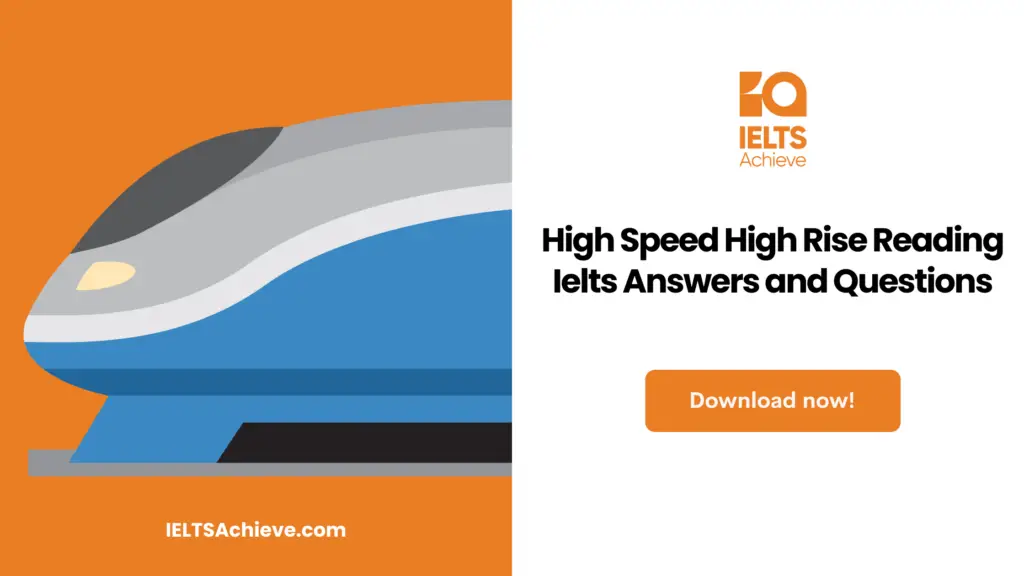
High Speed High Rise Reading Ielts Answers and Questions
The Blog post contains the following IELTS Reading Questions: IELTS Reading Passage – High speed…
- A Beginner’s Guide to IELTS
- Common Grammar Mistakes [for IELTS Writing Candidates]
Writing Correction Service
- Free IELTS Resources
- Practice Speaking Test
Select Page
IELTS Topics: Travel and Tourism
Posted by David S. Wills | Oct 12, 2020 | IELTS Tips | 0
One of the common IELTS topics that appears in the exam is that of travel and tourism. In today’s lesson, I will help you learn about this topic so that you can do well in your next test.
First we will look at a little vocabulary about travel and tourism , then we will explore some IELTS speaking and writing questions to give you an idea of what to expect.
Vocabulary about Travel and Tourism for IELTS
When you prepare for IELTS, you never need to know any specialist vocabulary, so for questions about travel and tourism you may find that you can give a brilliant answer with just simple language, as long as it is used with grammatical accuracy. Knowing the difference between “I went to London” and “I was going to London” is very important, for example.
Of course, there are other things to know. It helps to know modes of transport and related vocabulary. [You can learn about transport here .] Another interesting aspect is knowing things you might encounter while travelling, such as accommodation.
I made this PPT about travel accommodation many years ago, but I have just uploaded it today. 🙃 I hope you find it useful.
You should also know the necessary language to talk about types of travel or reasons for taking a trip. Sometimes, new words enter the language, such as “staycation,” which is a very recent portmanteau .
You might also find this list of synonyms for “trip” quite useful:
Travel and Tourism Questions [IELTS Speaking]
The topic of travel and tourism is really common in IELTS speaking. It could easily occur in any of the three parts of this test, so you should be prepared to answer a wide range of questions. [You can find some examples here .]
These questions will be pretty general and simple. It is entirely possible that the same basic question could be asked in a number of different ways.
Perhaps the most common question would be “do you like travelling?” This is very similar to “have you done much travelling?” Of course, the focus has changed slightly but the overall meaning is similar: it’s about you and travel .
I’ll give two sample answers to these questions so that you can understand better:
Q: Do you like travelling?
A: Yeah, I absolutely love travelling. I have visited many countries over the past few years, but of course this all stopped recently because of the virus.
Q: Have you done much travelling?
A: I have done quite a lot of travelling in my life. Altogether, I’ve visited about 50 countries and I try to spend a few weeks each year seeing new places.
Note: It is unlikely that these questions would be asked together because they are very similar. Also, I pretty much answered the second one in the middle of the first answer. I just included them to show how a “do you like travelling” IELTS answer example.
Vaguely Related: Space Travel
I definitely consider space to be a separate topic from travel, but there is some small degree of overlap here. For example, there is a reported IELTS speaking question that goes something like this:
- Do you want to travel in outer space?
- Would you want to travel in outer space?
You might also see this incorrectly reported as “do you want to travel in the outer space?” but this is not correct. We cannot say “the” before “outer space.” It is not a single, definite place. [Read about definite articles here .]
There are numerous possibilities for IELTS cue cards about travel. Here are two of them:
- Describe a place you have visited.
- Describe a place you would like to visit.
Of course, these would require basically the same sort of vocabulary to answer them, but the key difference would be the grammar. In the first instance, you are talking about the past, but in the second you are talking about a possible future.
Here is another one:
- Describe a memorable holiday.
This is pretty similar to the first cue card above, but the word “memorable” must guide our approach. You can see my answer in this video:
In part three of the IELTS speaking test, the questions will become more difficult. These will include abstract topics like age, gender, ethics, and so on. You might encounter questions like this:
Q: Do you think men and women enjoy different types of holiday?
A: I suppose that in general they probably do have different preferences, but of course we should acknowledge the fact that everyone is different and so there are women who enjoy stereotypically male holidays and men that enjoy stereotypically female ones. To give an example, it could be argued that men prefer more active, robust holidays that involve uncertainty, adventure, and even danger. However, I know some women who love this type of thing and so it is not really smart to make assumptions about people.
Q: Do you think that travelling abroad always changes people’s perspective on life?
A: No, not at all. While it certainly is possible that travelling can change people’s perspectives, it is by no means guaranteed. In fact, when you travel to places like Thailand, you see that most tourists have no understanding of the local culture and just hold on to their own original views. The experience may change some people, but I think most people live in a little bubble when they go abroad, and this prevents them from really learning anything.
Notes: I described the sort of travel that men like in interesting terms: “men prefer more active, robust holidays that involve uncertainty, adventure, and even danger.” This is good, descriptive language!
Travel and Tourism Essays for IELTS Writing
Now we shall move on from speaking and instead look at the IELTS writing test. In this section, I will show you some questions about travel and tourism, then show you my sample band 9 answer.
Here is a question that features data about people travelling. I thought that this travel and tourism essay was really interesting, so I have included it here alongside my sample answer.
The line graph displays the numbers of tourists that visited an unnamed Caribbean island between 2010 and 2017. The tourists are divided into two groups – those staying on cruise ships and those staying on the island itself – and these had a loosely inverse correlation. The total number of visitors, however, rose more or less continuously throughout the eight-year period.
In the first year recorded, which was 2010, there were about twice as many tourists staying on the island as those staying on cruise ships. A year later, the number staying on cruise ships doubled to a half million, but this dropped back to around a quarter million in 2012. When the figures for tourists on cruise ships dropped, the number staying on the island rose quickly and over the coming few years, as this sudden increased levelled off, the number of people who stayed on board their ship continued to grow again.
Between 2012 and 2017, there were more and more visitors staying on cruise ships. From just a quarter million, this rose to two million, while the figures for those on the island levelled off at just one and a half million and then dropped slightly in the penultimate year, before finishing at one and a half. This meant that, for the final two years, more tourists stayed on cruise ships than on the island.
Notes on the Answer
In the introduction, I said “an unnamed Caribbean island.” It can sometimes be difficult to introduce something whose name you don’t know, and this is a really convenient way to do it. I strongly recommend you say “an unnamed ___” when this situation arises.
I have also used very few numbers in this essay. Instead of writing 250,000 or 2,000,000, I have said things like “a quarter million” and “two million.” This is much easier. [You can read more about IELTS and numbers here .]
Here is another travel and tourism essay question:
In future, more people will choose to go on holidays in their own country and not travel abroad on holiday.
Do you agree or disagree?
Sample Band 9 Answer
In recent years, people have coined the word “staycation” to describe the phenomenon of taking a holiday closer to home. This essay will argue that such holidays will become more common in the future.
First of all, it may seem as though international travel will become increasingly common, but in fact it is quite clear that it is an unsustainable trend. The carbon cost of flying to another country is enormous, and so many people have begun to ask whether it is ethical to continue doing this. Beyond just the personal level, it is clear that pretty soon governments will have to impose restrictions to limit the number of flights; otherwise, the world will suffer immensely from the burden of so many journeys.
In many parts of the world, people are probably ready to embrace this situation. Humans have had a terrible impact upon the world and many feel that it is time to undo the damage done. This involves some measure of personal sacrifice, which in this case could be forgoing the sort of international trips that used to be quite common. However, this is not all bad. Although foreign countries and exotic locations are exciting, there are treasures almost everywhere. Countries like the UK have poor weather, which is why so many people travel to warmer climates, but the natural beauty of the landscape and the extraordinary historical and cultural sites present myriad options for curious travellers. There will likely be a resurgence of interest in such trips.
In conclusion, it is quite possible that in the future people will realise how much damage humans have done to the world. Many of them may endeavour to make the sort of sacrifices necessary to counteract this ecological destruction, and one small step is embracing local travel.
Notes on the Essay
First of all, you can see that I incorporated the word “staycation” right at the beginning. When you use modern language like this, please don’t just jam it carelessly into your essay. Often, it is very informal, so you can only use it when properly introduced. In this case, I clearly explained its meaning and commented upon it from a sociological perspective.
Here is some more travel and tourism vocabulary from my essay:
- unsustainable trend
- carbon cost
- impose restrictions
- international trips
- exotic locations
- warmer climates
- myriad options
- ecological destruction
You can see that a lot of my language related to the environment, and of course that is often tied to the topic of travel and tourism because of the negative impacts these have on our planet.
I hope that you enjoyed my IELTS essays on travel and tourism, as well as the sample speaking answers I provided. Please remember that your own answers should be unique to you . Don’t try to copy others too much. Your vocabulary will depend upon your life experiences and the places you would or wouldn’t like to visit.
About The Author
David S. Wills
David S. Wills is the author of Scientologist! William S. Burroughs and the 'Weird Cult' and the founder/editor of Beatdom literary journal. He lives and works in rural Cambodia and loves to travel. He has worked as an IELTS tutor since 2010, has completed both TEFL and CELTA courses, and has a certificate from Cambridge for Teaching Writing. David has worked in many different countries, and for several years designed a writing course for the University of Worcester. In 2018, he wrote the popular IELTS handbook, Grammar for IELTS Writing and he has since written two other books about IELTS. His other IELTS website is called IELTS Teaching.
Related Posts
7 Easy Steps to Achieve IELTS Success
August 27, 2017
Describe something you often do in the evening [IELTS Speaking Part 2]
August 23, 2018
The Countryside [IELTS Topics]
December 6, 2018
With the Development of Technology…
May 5, 2023
Leave a reply Cancel reply
Your email address will not be published. Required fields are marked *
This site uses Akismet to reduce spam. Learn how your comment data is processed .
Download my IELTS Books
Recent Posts
- How to Improve your IELTS Writing Score
- Past Simple vs Past Perfect
- Complex Sentences
- How to Score Band 9 [Video Lesson]
- Taxing Fast Food: Model IELTS Essay
Recent Comments
- David S. Wills on How to Describe Tables for IELTS Writing Task 1
- anonymous on How to Describe Tables for IELTS Writing Task 1
- David S. Wills on Writing Correction Service
- James Oluwasegun on Writing Correction Service
- Daisey Lachut on IELTS Discussion Essays [Discuss Both Views/Sides]
- Lesson Plans
- Model Essays
- TED Video Lessons
- Weekly Roundup
HALO Space unveils capsule design for stratospheric space 'glamping'
A Spanish balloon company plans to begin flying paying space tourists in 2026
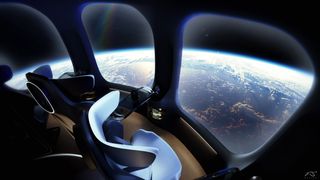
LONDON — Stratospheric balloon company HALO Space plans to offer aspiring space travelers the space tourism equivalent of glamping. Instead of tight space suits and stomach-churning G-forces typically attached to a rocket flight, the company's pressurized capsule, attached to a helium-filled balloon, will offer comfy swivel seats, giant windows and a selection of fine cuisine.
The Spanish-headquartered firm unveiled the design of the 3.9-ton (3.5 metric tonnes) Aurora capsule at an event in London on Wednesday, April 10, and said it hoped to begin commercial operations in 2026.
Unlike suborbital space tourism companies such as Virgin Galactic and Blue Origin , HALO Space won't be taking passengers high enough to experience weightlessness . The flight will be a rather leisurely affair lasting up to six hours, almost four of which will be spent hovering in the stratosphere some 22 miles (35 kilometers) above Earth's surface. There, high above the cloud tops, passengers will be able to admire the star-studded blackness of space above, as well as the curvature of the planet shrouded in the atmosphere beneath their feet.
Related: Space Perspective is nearly ready to fly tourists on luxury balloon rides near the edge of space (exclusive)
"When you talk to astronauts, they tell you that this experience of watching the planet from above is really something unique and extraordinary," HALO Space CEO Carlos Mira said in the press conference. "So far, only 650 humans have had the opportunity to experience this overview effect. But you don’t need to go all the way to space to have it. We hope to offer this experience to 1,000 people by 2030."
HALO Space is one of two companies currently readying its balloon technology to begin commercial operations in the next two years. The other is Florida-based Space Perspective, which revealed a completed test model of their Spaceship Neptune in February. HALO Space said they have conducted five test flights with a mockup and plan to take off for the first crewed test in 2025 before commencing flights with paying passengers a year later.
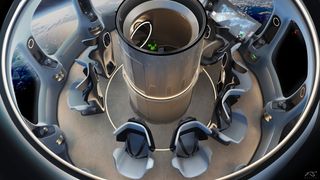
Both companies hope their propositions will attract a wider customer base than the jerky rocket rides of Blue Origin and Virgin Galactic, which propel daredevil clients on short joy rides to the edge of space and back. Reaching an altitude nearly three times higher than stratospheric balloons, Virgin Galactic and Blue Origin's spacecraft experience several-minute-long spells of microgravity before falling back to Earth .
Get the Space.com Newsletter
Breaking space news, the latest updates on rocket launches, skywatching events and more!
At $164,000 per seat, a trip with HALO Space will cost about a third of the price of a Virgin Galactic flight and won't require any advanced medical certifications.
"The take-off will be like being in an elevator," said Mira. "The ascent is soft and gentle, climbing at 12 miles per hour."
The 16-foot-wide (5 meters) and 11.5-foot-tall (3.5 m) capsule will be made of aluminum alloy and composite materials. With an internal space of 30.4 square feet (2.8 square meters), the spaceship could host eight paying passengers, plus a pilot. The internal atmosphere will be maintained by a life-support system similar to that of an aircraft. Yet despite this crammed interior and the extreme environment outside the capsule, passengers should still feel perfectly comfortable and able to relax.
"It's meant to be a sort of a glamping experience," Frank Stephenson, creative director and founder of Frank Stephenson Design who led the design work said at the conference. "It's a high-level experience for these people who are used to flying first class rather than economy."
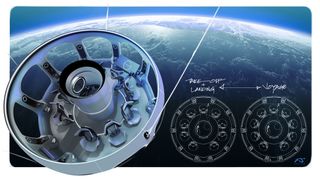
Stephenson, who had previously worked for high-end car makers including BMW, Ferrari, Maserati and McLaren, said the biggest challenge was keeping the capsule light enough so that it can be safely lifted by the balloon while still making sure every aspect of the interior lives up to the expectations of passengers.
“It's very easy to add weight to things and make it super comfortable," Stephenson said. "It's more difficult to reduce weight, reduce material and still make it feel like a very unique experience."
When fully inflated, the stratospheric balloon will be 460 feet (140 meters) tall, towering over the gleaming space capsule. The balloon is designed to detach from the capsule during descent. The capsule will then be brought down to a landing under a steerable parachute. Mira said the balloon technology is inherently safer than rockets loaded with explosive fuels. It also produces no greenhouse gas emissions, making the experience 100 percent compliant with the most stringent environmental protection standards.
— Space Perspective wants to take tourists on balloon rides to the stratosphere
— Space Perspective partners with Exclusive Resorts for balloon rides to the stratosphere
— Space Perspective starts selling seats for balloon rides
"We are using mature technologies," said Mira. "Balloons in general have been around for more than 200 years. This type of balloon, stratospheric balloons, have been around for almost 100 years. The first human went to the stratosphere on a balloon in 1931."
HALO Space plans to fly from spaceports in the Mojave Desert in the U.S., Spain, Australia and Saudi Arabia. The company is currently working with the U.S. Federal Aviation Administration to receive a license before its first crewed flight next year.
Join our Space Forums to keep talking space on the latest missions, night sky and more! And if you have a news tip, correction or comment, let us know at: [email protected].
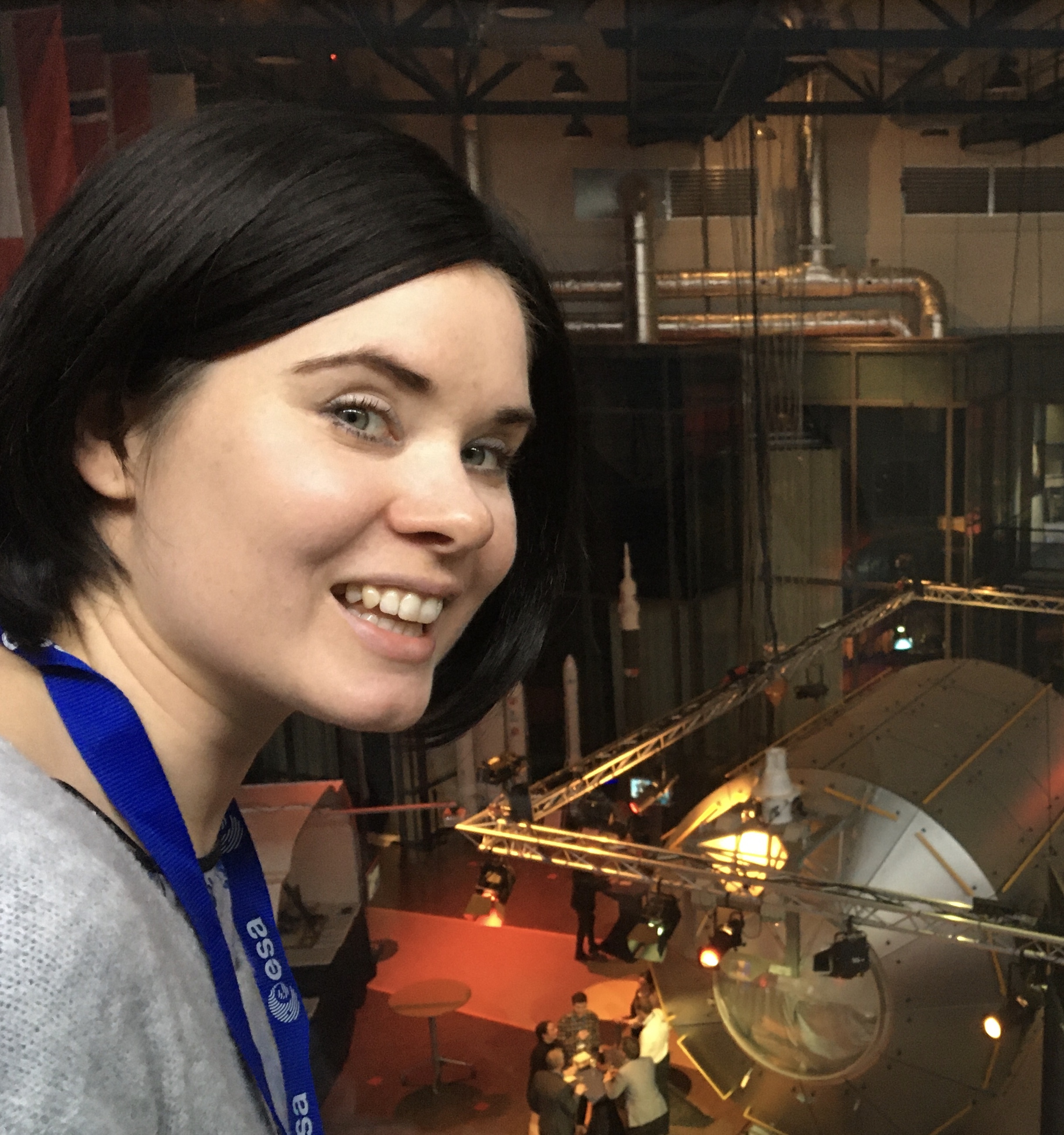
Tereza is a London-based science and technology journalist, aspiring fiction writer and amateur gymnast. Originally from Prague, the Czech Republic, she spent the first seven years of her career working as a reporter, script-writer and presenter for various TV programmes of the Czech Public Service Television. She later took a career break to pursue further education and added a Master's in Science from the International Space University, France, to her Bachelor's in Journalism and Master's in Cultural Anthropology from Prague's Charles University. She worked as a reporter at the Engineering and Technology magazine, freelanced for a range of publications including Live Science, Space.com, Professional Engineering, Via Satellite and Space News and served as a maternity cover science editor at the European Space Agency.
NASA's Fermi space telescope finds a strange supernova with missing gamma rays
Across the universe, dark matter annihilation could be warming up dead stars
Boeing's Starliner spacecraft is 'go' for May 6 astronaut launch
Most Popular
- 2 Russian cosmonauts make quick work of space station spacewalk
- 3 Curiosity rover may be 'burping' methane out of Mars' subsurface
- 4 Boeing Starliner 1st astronaut flight: Live updates
- 5 Lego reveals NASA Artemis rocket, Milky Way galaxy sets coming in May
New challenge unlocked: hiking with a newborn. How to keep your baby safe on the trails
- Show more sharing options
- Copy Link URL Copied!
Last week, my wife and I embarked on a special outdoor adventure. By the numbers, it wasn’t that impressive — a 2.3-mile, 300-foot “hike” up to the Baldwin Hills Scenic Overlook . It took an hour from start to finish. Much of the route was paved. But it was a major milestone for one very important reason: It was our first hike with our newborn daughter, Emma.
In the days before this short but important trip, some pressing questions bounced around my head. Would Emma put up a fight as I wrestled her into the BabyBjörn carrier? Would she wail the whole way up the hill? Would she spit up all over me? (It wouldn’t be the first time.)
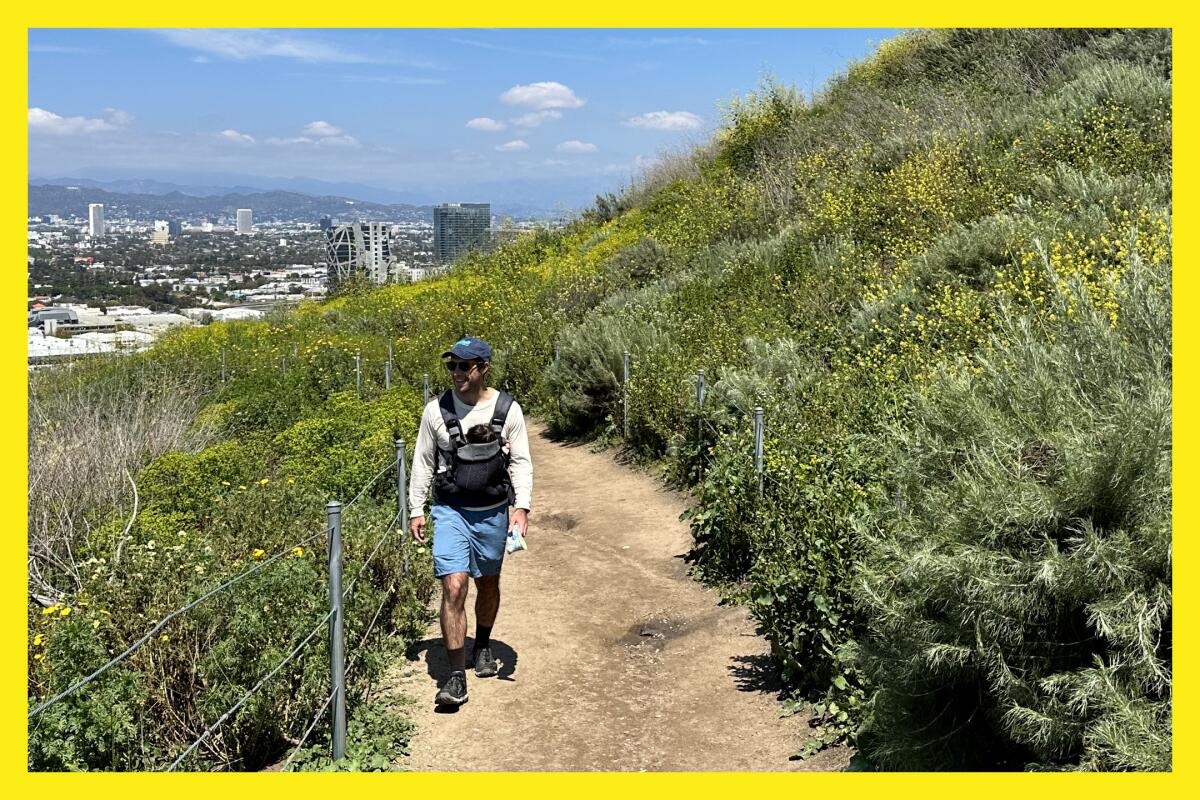
You are reading The Wild newsletter
Sign up to get expert tips on the best of Southern California's beaches, trails, parks, deserts, forests and mountains in your inbox every Thursday
You may occasionally receive promotional content from the Los Angeles Times.
I was also skeptical about how enriching a hike could be for a 2-week-old infant. Emma can barely see. After nine months in the womb, just lying in her crib must feel like visiting another planet — would she even notice the difference between indoors and outdoors?
To calm my nerves, I spoke with Dr. Rebecca Dudovitz, a pediatrician with UCLA Health. I was relieved to learn that babies, even those as young as Emma, appreciate time outside just as much as adults do.
“It’s a great way to stimulate their development with new senses and sounds, smells, things to look at,” said Dudovitz.
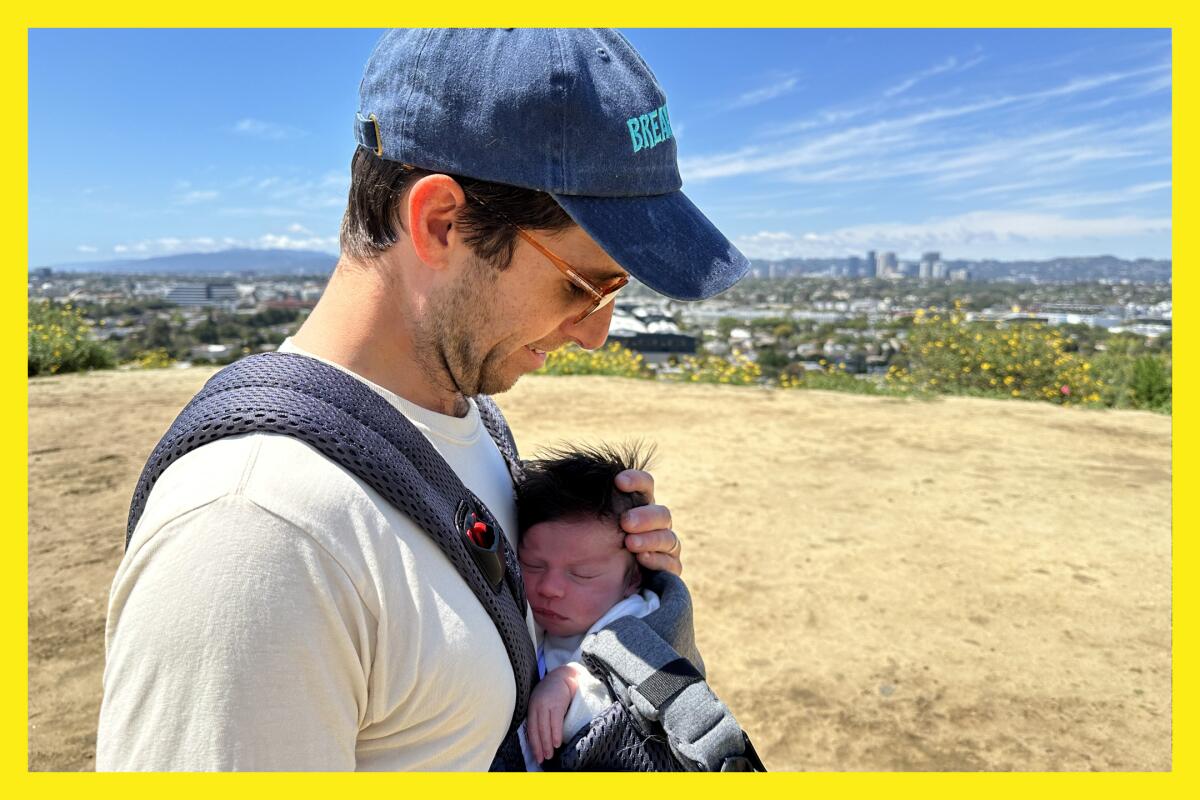
Outdoor time offers a host of benefits for babies. In addition to sensory stimulation, it exposes them to common allergens, which reduces their risk of developing allergies later in life, and it’s actually safer than spending time in crowded indoor places — they’re less likely to catch a virus from another person. Perhaps most importantly, going outside can calm a fussy newborn (and their exhausted parents).
“It can be a useful strategy, especially at the end of the day when everybody’s tired and cranky,” said Dudovitz.
Dudovitz also gave me a few tips to ensure our hike was a success. Rule No. 1 is to keep babies out of the sun, as a newborn’s skin is sensitive and sunscreen isn’t approved for use until they’re 6 months old. (Long sleeves and a sun hat are required equipment.) She recommends staying away from places with mosquitoes; if you can’t avoid bugs, you can pre-treat baby clothes with Permethrin to ward them off. Finally, pay close attention to heat and cold as babies can’t regulate their temperature as well as adults can (feel your child’s torso to gauge their temperature).
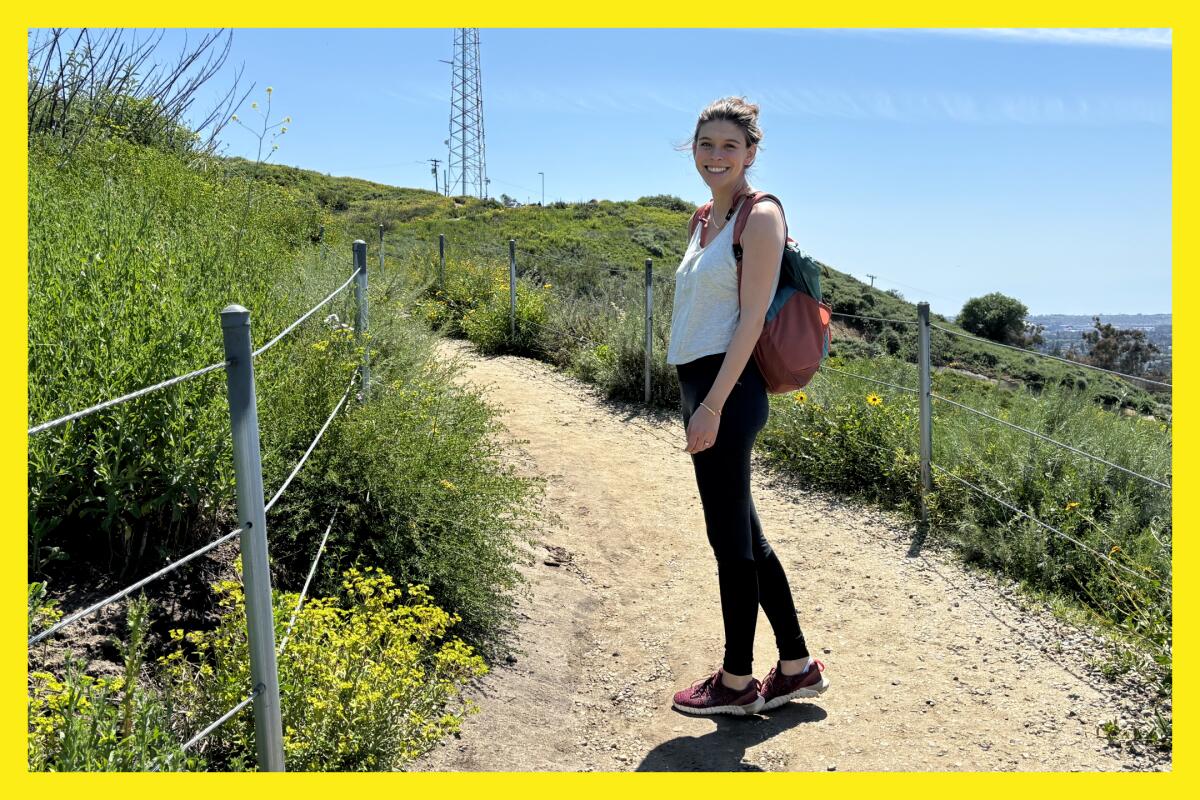
Armed with that info, my wife, Emma and I headed out for our first hike. It was a perfect Southern California day, the kind that makes you wonder why anyone would choose to live elsewhere. Warm sunshine spilled down from a deep blue sky, and a fresh breeze rolled in from the ocean as we trekked up the hill from the parking lot.
All around us, the chaparral was lush and alive with blossoms. Mounds of bush sunflowers glowed in the afternoon light, and here and there I noticed patches of coast morning glories, their delicate white cups streaked with purple. Amid the blooms, sagebrush branches stood out with their wispy pale green leaves. I touched them as we passed and savored their sweet, earthy scent. When we reached the top of the overlook, we could see for miles in all directions — the Santa Monica Mountains rising in the distance, the broad blue plane of the Pacific Ocean, and the skyscrapers of downtown L.A. poking up to the east. It was beautiful.
What did Emma think of it? Hard to say. She slept the entire time, stirring only when I took off her hat to snap photos. I think she opened her eyes for 30 seconds total. Even so, my wife and I enjoyed the excursion, and I’m calling this inaugural family hike a success. Next time, maybe Emma will be awake to hear, smell, see and feel all of it too.
3 things to do
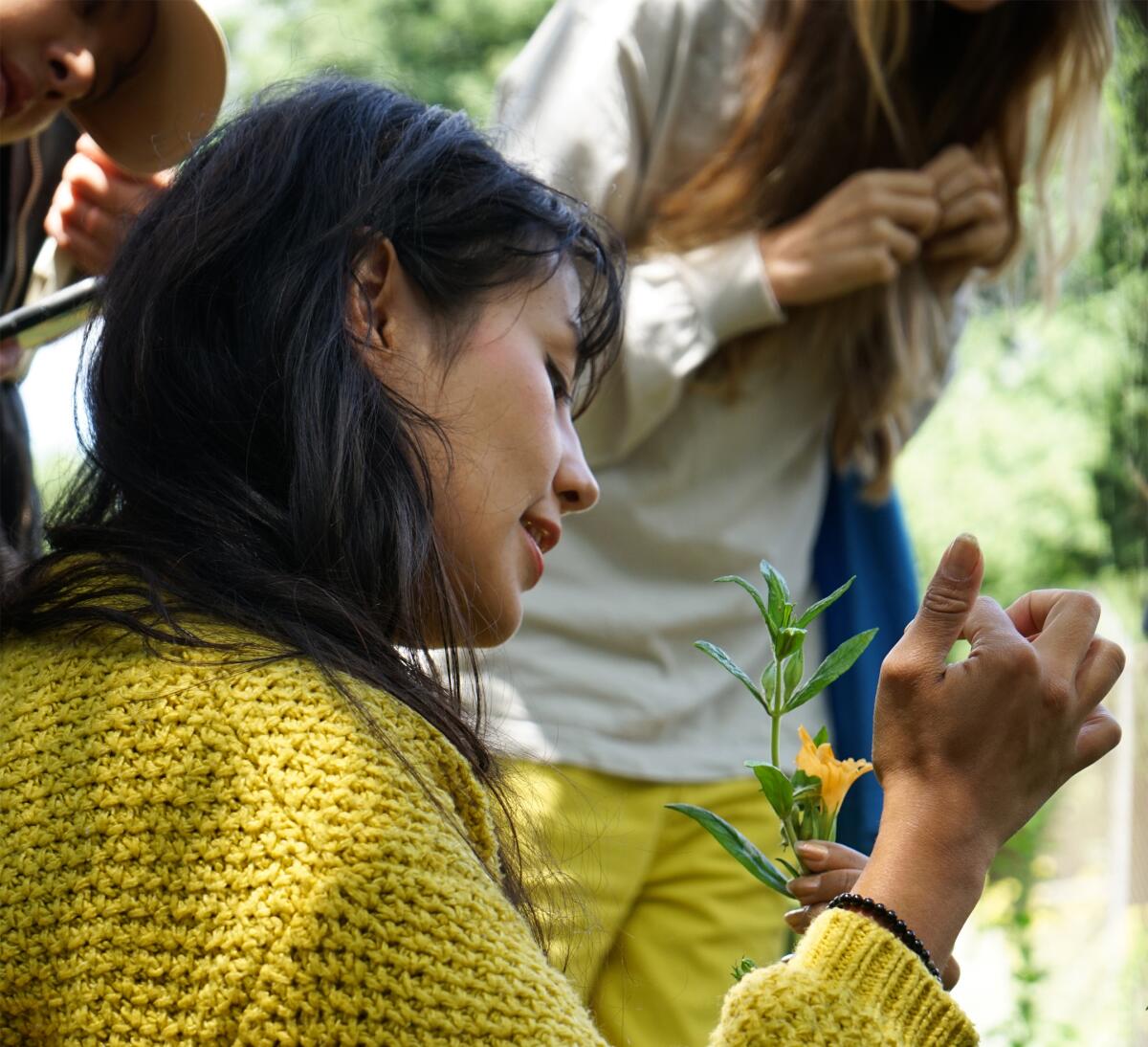
1. ID plants and potluck in Topanga Canyon
Go for an all-levels plant identification stroll in the mountains of Topanga with Herb Club LA . The 2.5-mile walk will last about an hour and is open to everyone (even leashed dogs). Afterward, the group will be holding a “late Earth Day celebration” at the dreamy local Topanga shop the Well Refill for a tea meditation and potluck featuring herbal sodas and vegan chocolate. Participants are encouraged to wear comfortable clothes and appropriate shoes for the hike, and — if they plan to take part in the potluck — to bring vegan dishes and reusable plates, cups and utensils to minimize waste. The event is free (with donations accepted) and kicks off Sunday at 11 a.m. For more information visit eventbrite.com .
2. Bike, walk, skate or scoot in SGV
Ditch the car on Sunday and experience what it’s like to roam freely on five miles of streets in Alhambra, San Gabriel and South Pasadena. Active Streets: Mission-to-Mission , presented by Metro Los Angeles and hosted by San Gabriel Valley Council of Governments (SGVCOG), is a car-free celebration packed with live music performances, pop-up booths from local businesses and community organizations, and free games and activities. Walk, bike, skate or scoot through any part of the route — or conquer the whole thing, if you choose. The free event runs from 9 a.m. to 3 p.m. If you’re a San Gabriel Valley resident, you can borrow a classic GoSGV electric bike for $50 by filling out this form . Active Streets was formerly known as 626 Golden Streets — with the Metro “Gold” line becoming the “L” and then the “A,” the name changed.
3. The Earth Day celebrations continue
Though Earth Day happened on Monday, the L.A. celebrations are still going strong. On Saturday, you’ll find guided nature hikes and storytelling at the Chatsworth Nature Preserve , a seed swap at Barnes Park in Monterey Park and the Teen Climate Fest at Long Beach’s Aquarium of the Pacific . You can also get your gloves dirty on Saturday at the Madrona Marsh in Torrance, which is hosting a habitat restoration event . Pre-registration is required and participants should wear closed-toe shoes and bring sunscreen and water.
The must-read
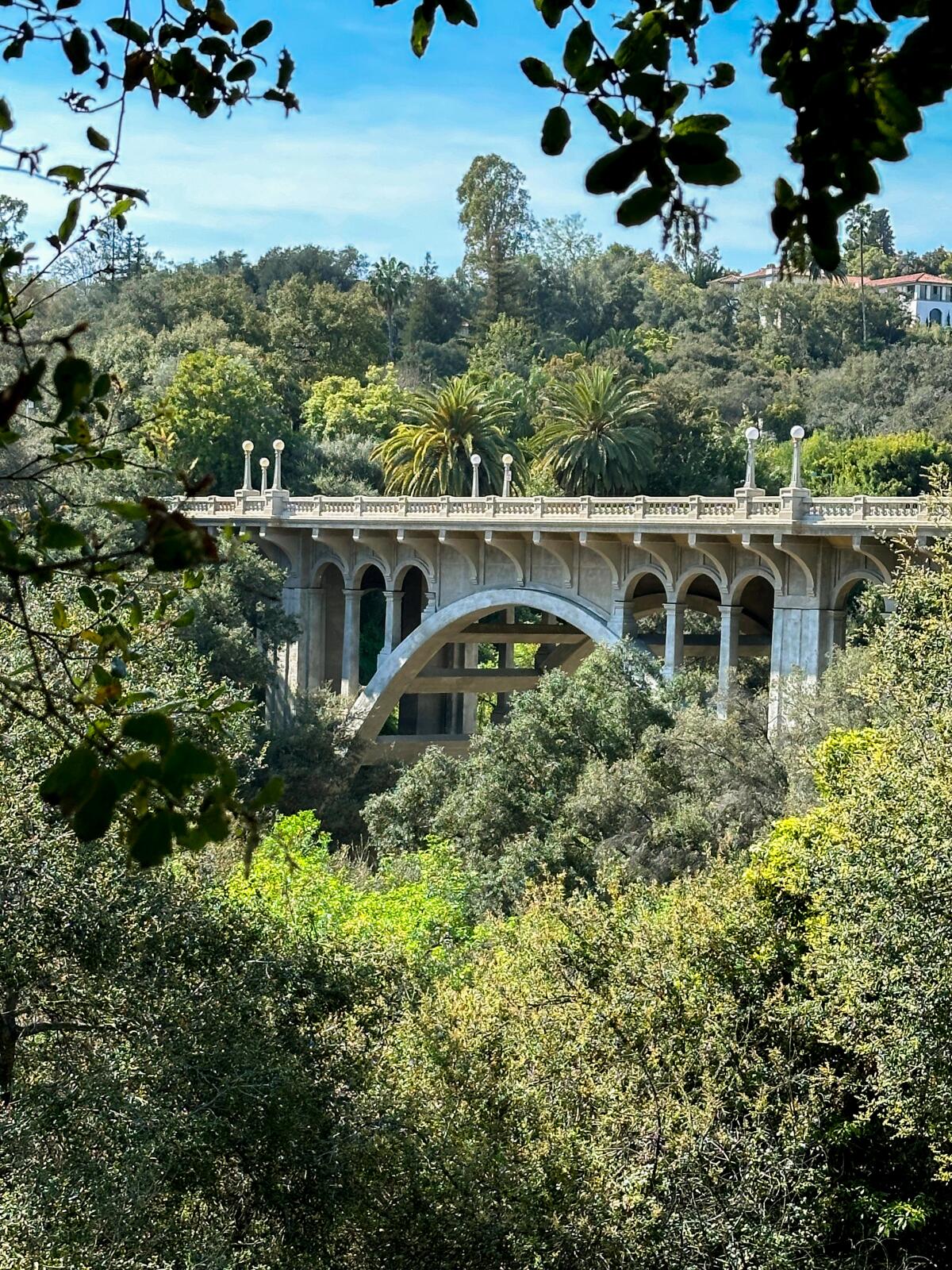
Here’s a fun idea for getting outside and exploring Los Angeles: Go on a walking tour of the city’s bridges. For The Times, writer Adam Markovitz highlights nine spans all around L.A. that are worth checking out, including quaint walkways over the Venice Canals, the historic Shakespeare Bridge in Los Feliz and the new 6th Street Viaduct over the L.A. River. Whether you’re in it for the architecture or looking for some new views of the city, these bridges won’t disappoint.
Happy adventuring,

A recently published book, “ Places We Swim California ,” will get you excited to jump in the water this summer. It highlights over 60 swimming spots all around the state (including several in SoCal) and features road trip itineraries for discovering unique California beaches, rivers and hot springs.
For more insider tips on Southern California’s beaches, trails and parks, check out past editions of The Wild . And to view this newsletter in your browser, click here .
Sign up for The Wild
We’ll help you find the best places to hike, bike and run, as well as the perfect silent spots for meditation and yoga.

Michael Charboneau is a freelance writer covering gear and the outdoors, and he’s writing The Wild newsletter for a few months. He has written for a variety of publications, including Men’s Journal, Runner’s World and InsideHook, and he lives in West L.A. When he’s not writing, he can be found running, hiking and biking around Los Angeles and its mountains.
More From the Los Angeles Times

World & Nation
Venice tests 5-euro entry fee for day-trippers as the city grapples with overtourism
April 25, 2024

Travel & Experiences
This must be Larchmont

What to know about California’s new state park, a scenic green space where two rivers meet
April 23, 2024

This must be Topanga Canyon
April 19, 2024
We've detected unusual activity from your computer network
To continue, please click the box below to let us know you're not a robot.
Why did this happen?
Please make sure your browser supports JavaScript and cookies and that you are not blocking them from loading. For more information you can review our Terms of Service and Cookie Policy .
For inquiries related to this message please contact our support team and provide the reference ID below.

IMAGES
VIDEO
COMMENTS
Outer Space Travel & Stars IELTS Speaking Vocabulary for Part 2 & 3. Meticulous. Meaning: showing great attention to detail; careful and precise. Example: The meticulous work of the student impressed the teacher. Terrain. Meaning: physical features of a tract of land, such as its elevation, slope, and surface characteristics.
Space Flight Tourism IELTS Reading Passage with Answers. Reading Passage 2. You should spend about 20 minutes on Questions 14-26 which are based on Reading Passage 2 below. Space Flight Tourism. Falcon 1's successful launch on 28th of September was an outstanding achievement for the fledgeling space tourism industry. When a rocket made by ...
B. Development of reusable rocket technology. The passage states this as a significant milestone in the development of space tourism. A4. B. Zero gravity experience. The allure of experiencing zero gravity is highlighted in the passage as a unique aspect of space travel. A5.
IELTS Reading: Space. It is very possible that you could encounter a reading passage about space in your IELTS test. This could cover almost any aspect of space because the reading test allows for difficult ideas. There may be questions about space travel, science, life on other planets, the history of space travel, and so on.
Space travel will become a growing industry in the future because more and more people are now like as they are familiar as they are now familiar with outer space. They eagerly want to travel in space so that it will increase in the future. IELTS Speaking Part 1 Foreign Food. IELTS Speaking Part 1 Weekends.
IELTS Essay: Space Travel. This is an IELTS writing task 2 sample answer essay on the topic of space travel from the real IELTS exam. Please consider supporting my efforts to creative high quality IELTS materials for students around the world by signing up for my Patreon (and so you won't miss out on any of my exclusive IELTS Ebooks)! Dave.
How to answer - Space Travel - The Perfect Speaking Part 1 Response. By ielts-jonathan.com on 5 February 2021 0. 2 Did you know that the first part of the IELTS Speaking test can be the most difficult for candidates. 2.1 A relaxed candidate always listens better and responds well. 2.1.2 TIP- IELTS Part 1 features 'three' random topics ...
Yes, I bet it would be very funny to travel around the outer space. Considering the current technology development and expensive cost, space travel would be memorable experience in my life. I would like to do something that can be don on earth. I will try to fly in the air like birds, or jump long distance like a grasshopper, or even I could be ...
Speaking part 1 Maps. Speaking part 1 Being bored. Speaking part 1 Text Messaging. Credit : Photo by Jeremy Straub on Unsplash. Editorial Staff. Our Editorial Staff at IELTS Rewind provides exclusive tips, tricks, and IELTS material to help enhance your band score. They are an integral part of our team, dedicated to your IELTS success.
Could these two high-profile journeys to the edge of space by wealthy businessmen Jeff Bezos and Richard Branson mean space travel is one step closer for the rest of us? Well, to go anytime soon, you would need a lot of money. One seat on board billionaire Jeff Bezos's rocket ship was auctioned for 28 million dollars.
Samples on Space Exploration Essay IELTS Sample 1: Advantages and Disadvantages of Space Exploration . Space exploration is the detailed exploration of space, the solar system, and the universe. It is explored by robotic spacecraft and spaceflights. Earlier 'Space Race' was only popular between the United States and the Soviet Union.
These lines indicate that the primary aim of studying the effects of space travel on the human body is to identify important medical problems and find appropriate solutions to these problems. Thus, the statement agrees with the information, so, the answer is Yes. 9 Answer: Not Given. Question type: Yes/ No/ Not Given.
Question 2. What would you do if you had the opportunity? Answer - If I would have this opportunity, then I would definitely encash this opportunity and love to visit outer space during this journey. I would click many photos as my memories, or I would take one of my best friends with me along at this. Question 3.
Hi simon; My answers; 1- It means it is desirable but not likes to happen. 2- Ages of space. 3- 1st privately funded humane space flight is completed. 4- Handed over 200000 dollars each of 2.5 hours space flight. 5- Orbiting hotel. 6- Planning sub-orbital flights. Thanks.
14 in disaster zones. Answer: FILTER CONTAMINATED WATER. Miniaturization. saving weight. wearing small monitors comfortably. Space Travel and Health reading practice test has 14 questions belongs to the Recent Actual Tests subject. In total 14 questions, 5 questions are YES-NO-NOT GIVEN form, 5 questions are Matching Headings form, 2 questions ...
A. activities of tourists and scientists have harmed the environment. B. some sites in space could be important in the history of space exploration. C. vehicles used for tourism have polluted the environment. D. it may be unclear who has responsibility for historic human footprints.
Model Essay 3. Space travel, once a distant dream, is now verging on the realm of reality for not just astronauts, but potentially for tourists too. The advent of space tourism is a development I view as exceedingly positive, for it not only epitomizes human innovation but also holds the promise of profound societal impacts. Primarily, space ...
Space Travel Has Been Made Possible for Some Time IELTS Writing Task 2 consists of three sample answers provided below. The task requires the candidates to provide a tentative and argumentative answer for the question. The sample answers comprises two parts: Introduction and body. The introduction is a brief description about the topic.
Space Exploration Questions. Essay questions for the topic of space exploration in IELTS writing task 2. Some scientists think that there are intelligent life forms on other planets and messages should be sent to contact them. Other scientists think it is a bad idea and would be dangerous. Discuss both views and give your own opinion. (2017, 2022)
SPACE EXPLORATION is a common topic in IELTS. Here is a list of words that you need to know to get a good score. 1. The space race. Meaning: competition between the US and the Soviet Union in the 1950s and 60s to be the first to explore space. Example: The space race in the 1950s marks an important point in the development of space exploration.
Some people believe that space travel is a waste of government money while others believe it is important for human development. Discuss both these views and give your opinion. Space research is a waste of money. The government should spend money on improving the conditions of people living on Earth.
IELTS Reading Passage: Space travel and health. Space travel and health. A. Both in the United States and Europe, space biomedicine is a relatively new field of study. Its primary goals are to investigate how space travel affects the human body, pinpoint the most pressing medical issues, and come up with solutions for those issues. NASA and/or ...
Travel and tourism is one of the most common IELTS topics. Learn the best vocabulary and read the best sample answers in this lesson. TRENDING: IELTS Speaking Partners. ... Vaguely Related: Space Travel. I definitely consider space to be a separate topic from travel, but there is some small degree of overlap here. For example, there is a ...
India is one of the world's top spacefaring nations. It is the first Asian country to reach Mars orbit, and the fourth on the planet to take a spacecraft to the moon, landing closer to the south ...
LONDON — Stratospheric balloon company HALO Space plans to offer aspiring space travelers the space tourism equivalent of glamping. Instead of tight space suits and stomach-churning G-forces ...
Unprecedented, torrential rainfall plunged parts of the United Arab Emirates underwater last week, bringing life to a standstill in Dubai and elsewhere.
Last week, my wife and I embarked on a special outdoor adventure. By the numbers, it wasn't that impressive — a 2.3-mile, 300-foot "hike" up to the Baldwin Hills Scenic Overlook. It took ...
Virgin Galactic Holdings Inc. is proposing a reverse split of its beaten-down shares as the Richard Branson-founded space tourism company tries to maintain compliance with stock market standards.